KUBRICK'S LOLITA
A SHOT-BY-SHOT ANALYSIS
PART TWO

Go to TOC for this film ( (which has also a statement on purpose and manner of analysis and a disclaimer as to caveat emptor and my knowing anything authoritatively, which I do not, but I do try to not know earnestly, with some discretion, and considerable thought).
A NOTE ON THIS ANALYSIS. I COMPARE, SCENE BY SCENE, AT THE END OF EACH, KUBRICK'S FILM WITH NABOKOV'S SCREENPLAY. I HAVE ALSO UNDERLINED THAT DIALOGUE WHICH IS FROM THE NABOKOV SCREENPLAY BUT WHICH IS USUALLY PARAPHRASED. DIALOGUE IN THE FILM WHICH WAS IN THE BOOK, BUT NOT IN THE SCREENPLAY, MAY BE UNDERLINED BUT IS OFTEN INSTEAD OUTLINED IN THE COMPARISON SECTION OF EACH SCENE.
TOC and Supplemental Posts | Part 1 | Part 2 | Part 3 | Part 4 | Part 5 | Part 6 | Part 7 | Films Home
LINKS TO SECTIONS OF THE ANALYSIS ON THIS PAGE:
4 Years Earlier, Shot 64
Counting shots with Kubrick. Linking Lolita and Day of the Fight via chess.
Humbert Arrives in Ramsdale, Shots 65 through 71
Location: Westerly
Location: Dover
Humbert Takes a Room in the Haze Household, Shots 72 through 82
A Problem with Discussing Kubrick's Lolita
Humbert Takes a Room, Differences Between Kubrick and Nabokov in this Section
Harold Haze
The Curse of Frankenstein, Shots 83 through 93
Frankenstein at the Drive-In, Differences Between Kubrick and Nabokov in this Section
Why Frankenstein?
The Chess Game, Shot 94
The Chess Game, Comparing Nabokov to Kubrick
Humbert is photographed, Shot 95
Humbert is photographed, Comparing Nabokov to Kubrick
The School Dance, Shots 96 through 120
The School Dance, Comparing Nabokov to Kubrick
Doubles and the Farlows
The (Presumably) Golden Goose
A Cozy Little Dinner for Two, Shots 121 through 136
A Cozy Little Dinner for Two, Comparing Nabokov to Kubrick
Cat Woman
On MA and the Hand and the Quill
Breakfast with the Divine Edgar, Shots 137 through 152
Breakfast with Edgar, Comparing Nabokov with Kubrick
Two-fold Natures, Twists and Turns
Punctuating, Again, the Idea of the Eternal Return and Deja Vu
Dim, Mid and Ma'am
A Glorious Surprise, Shots 153 through 166
Surprise, Comparing Nabokov and Kubrick
The Sweets
The Lamps
64 4 YEARS EARLIER (12:19)
Kubrick was a chess player and so I pay attention with shot 64 being the demarcation that moves us from the present to the past. in Day of the Fight in the original production Kubrick had the boxer, Walter Cartier, approach the boxing ring in shot 64, and had anticipated this in shot 30 with the statement, "It's 4. 6 hours before he enters the ring." In the 2nd, Bonafield Production, as an intro was added, it threw off the numbering of the shots, so it seems that the young Kubrick, to preserve the use of 64 in the original cut, edited the introduction so it was composed of 64 shots. That placed what was shot 30 in the original production at shot 94. If we go to shot 94 in Lolita we happen to have the first shot of the one section in which Charlotte and Humbert play chess, and as it happens that is the only shot in that section, so the entire segment devoted to the chess game is fulfilled in that single shot, 94. Beautiful! Now, how can we be confident that Kubrick is referring to shot 30 in Day of the Fight which became shot 94 due the 64 shots added in the introduction? Because in shot 95, in Lolita, Kubrick has Lolita counting off her number of twirls of a hula-hoop, and Kubrick has her begin with the number 31.
I have a little more information on this in the analysis of Day of the Fight.
65 Cut to shot of a plane flying over New York city harbor. Cheerful and wholly innocuous music. (12:23)
HUMBERT (voice over): Having recently arrived in America...
66 Shot of a 2029 NH train. (12:28)
HUMBERT: ...where so many Europeans had found a haven before...
67 Shot of a small town main street. We see the distant cupola of a court house. Lacy's department store. A prominent sign for FURNITURE lords over the scene and reminds of Quilty's remark, in the first part, that he has friends Humbert could use as pieces of furniture. Above the word FURNITURE is a name of the company we can't make out (or I can't). Beneath it is the word "Quality" which may remind also of Quilty. (12:32)
HUMBERT: ...I decided to spend a peaceful summer in the...
68 Shot of a small town from a hill. (12:36)
HUMBERT: ...attractive resort town of Ramsdale...
Shot 65 | Shot 66 |
 |  |
Shot 67 | Shot 68 |
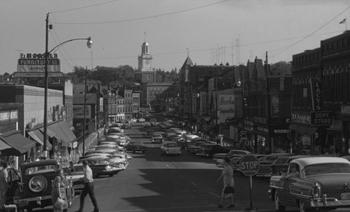 |  |
Shot 69 | Shot 70 |
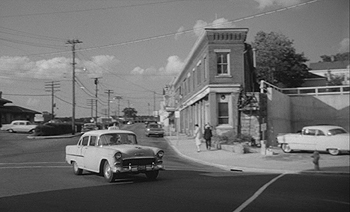 | 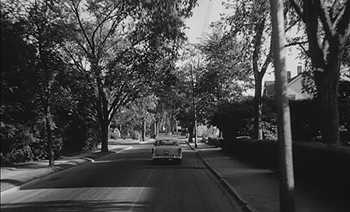 |
69 A cab driving down a street away from perhaps a train depot. (12:38)
HUMBERT: ...New Hampshire. Some English translations that I'd made of French poetry...
70 Quick crossfade to LS from rear of the cab going down a residential street. (12:44)
HUMBERT: ...had enjoyed some success, and I'd been appointed to a lectureship...
71 Crossfade to cab now coming toward us on a residential street, it turning into a driveway, between two posts, a woman and a a boy and girl walking past a PO collection box away from the camera. (12:47)
The posts are marked 242.
HUMBERT: ...at Beardlsey College, Ohio, in the fall.
The cab pulls up before the Hazy house, its yard embraced by a white picket fence.
HUMBERT: Friends had given me several addresses in Ramsdale where lodgings were available for the summer.
The cab stopping, Humbert climbs out. The music, which had tempered, ends.
Reelstreets.com gave the location of the rail station as the Westerly station on Railroad Avenue, Westerly, Rhode Island. I made a screengrab from Googlemaps.
Reelstreets.com once identified Shot 69 as being possibly from Marlborough Street in Newport, Rhode Island, "with the tower of City Hall rising in the centre background". I believed this was a misidentification as the two buildings, as you can see below, though looking much the same are very different.
I did eventually find the location. This Lacy's Department Store used to be located at 442 Central Avenue in Dover, New Hampshire and what is viewed in the distance is Dover City Hall.
For further elaboration on shots 66 and 69 see the post Location Shots 66 and 69, From Westerly, Rhode Island, to Dover, New Hampshire, and Back to Westerly.
For further elaboration on shot 67 see the post Shot 67 of Lolita and the Why of the Choice of Dover as an Establishing Shot for the Location of Ramsdale (The Story of the Caged Starling).
Update 2020: See this post for the location of shot 70 in Westerly.
72 Crossfade from Humbert approaching the house to the interior, his climbing the stairs to the second floor with Charlotte. (13:01)
She has a cigarette in a cigarette holder--likely a Drome, a poster for which we will see is in Lolita's room as Quilty is featured in the ad--and wears a short jumper-dress with a leopard belt over a dark mock turtleneck and pants. They pass a painting of a matador and bull--think Minotaur as the film opened with references to a maze.
CHARLOTTE: Mr. Hoffstetter said that you're going to be staying all summer?
HUMBERT: Well, that was only a tentative plan.
CHARLOTTE: Oh, Monsieur, if what you are needing is peace and quiet...
They reach the second floor. We see a painting of a Mexican in a sombrero standing in a doorway, that painting leaning against another painting of a landscape that looks like a Van Gogh but I can't find anything like it by Van Gogh. As they walk down the landing they pass by a painting of a house and trees, and another painting of a bull in the ring.
CHARLOTTE: I can assure you, you couldn't get more peace anywhere.
HUMBERT: Yes, it is...
Charlotte's laughter interrupts.
HUMBERT: ...very peaceful.
She passes a large porcelain cat on a dresser, leading him into a bedroom.
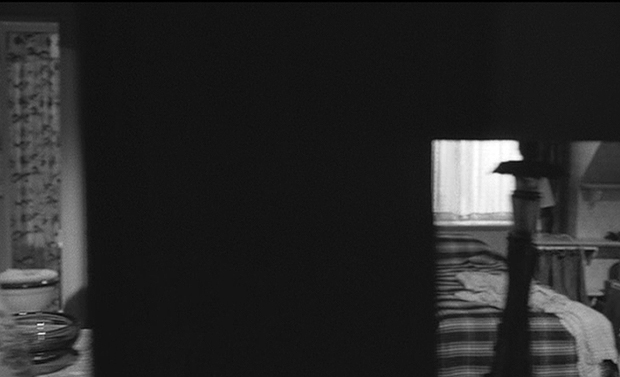
CHARLOTTE: Now, this would be your room. It's what you might call a studio. Well, you know, a semi-studio affair.
The bedroom has a small bed on which may or may not rest a man's pajamas. A chest holds some books and pottery. A desk and chair are situated before a window. There are boxes and a hat box in the corner, a couple of bookshelves on an opposite wall, the upper shelf of very little utility as there's not enough room to hold items of any height.
CHARLOTTE: It's, uh, very male. And, uh, quiet.
Humbert looks around in dismay.
CHARLOTTE: We're really very fortunate here in West Ramsdale, culturally we're a very advanced group with lots of good Anglo Dutch and Anglo Scotch stock.
Humbert looks in the closet, Charlotte having sat at the desk.
CHARLOTTE: And we're very progressive, intellectually.
HUMBERT: That is immediately apparent.
He tests the bed.
CHARLOTTE: Oh, I do hope you'll want to address our club. There's a nice view from this window...of the front lawn. And a good place for you to do your writing. Shelves for your books.
HUMBERT: That's very nice.
CHARLOTTE: I am chairman of the great books committee. As a matter of fact...
Humbert withdrawing, Charlotte rises and follows him out.
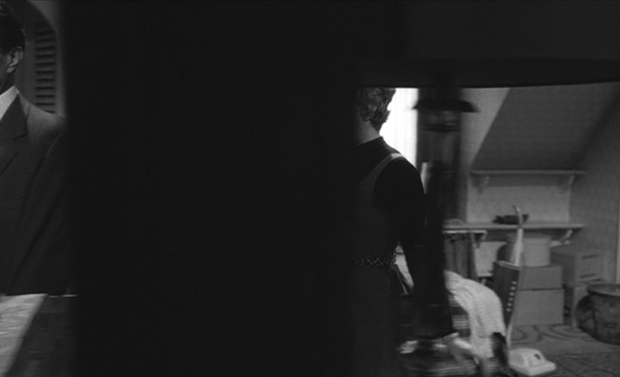
Humbert stops to look at the porcelain cat on the dresser and a painting above. The painting seems to be of a person hiding their face while crying.
CHARLOTTE: ...y'know, one of the speakers that I had last season was Clare Quilty.
HUMBERT: Clare Quilty.
CHARLOTTE: Yeah, the writer, TV, TV play.
HUMBERT: No...I wouldn't...
Her bracelet pings against the glass ashtray on the dresser, reminding of Quilty's pingpong ball striking and pinging the glass on the pingpong table.
CHARLOTTE: Oh, he's a very stimulating type of man. He gave us a talk on Doctor Schweitzer and Doctor Zhivago.
HUMBERT: Schweitzer and Zhivago.
CHARLOTTE: Uh-huh.
HUMBERT: Very nice.
As he turns to wander away, she directs him toward the bathroom.
CHARLOTTE: Oh, no, no, the bathroom's back here, right next door. Well, we still have that good old-fashioned quaint plumbing. Should appeal to a European.
She flushes and laughs. They exit and she grabs a sock off a chair.
CHARLOTTE: Oh, excuse the soiled sock.
She puts it in a dresser drawer.
CHARLOTTE: I see that you're interested in art. In that case...
73 Cut to medium-long shot from down the hall of Charlotte leading Humbert to her bedroom. (14:52)
Shot 72 was especially long, nearly 2 minutes, taking us from the stairs, to the end of the landing and what will be Humbert's bedroom, then back down the landing to the bathroom and now Charlotte's bedroom.
CHARLOTTE: In that case you really must see the collection of reproductions I have in my bedroom.
The camera passes behind a wall as they enter Charlotte's room. Beyond the 4th wall it tracks with them, peering through the hangers of a closet as they enter Charlotte's bedroom. It's a beautiful shot and scarcely noticed.
Rather than Charlotte's bedroom directly opening onto the second floor landing, it opens instead onto a small alcove off it. A drawn curtain separates the alcove from the landing. This entrance alcove is further obscured by the camera peering through a decorative screen.
CHARLOTTE: Voila!
HUMBERT: Ah, yes. That's, uh...
CHARLOTTE (pointing to a painting): Dufy!
HUMBERT: Hmm, that's very...
CHARLOTTE: And there's my little Van Gogh. Monet. Is Madame Humbert...?
We don't see any of these paintings to which Charlotte's hands direct us, instead viewing briefly others.
HUMBERT: There's no Madame. We are divorced.
CHARLOTTE (interest heightening): Oh.
HUMBERT: Happily divorced.
CHARLOTTE: When did all this happen.
HUMBERT: About a year ago, in Paris.
CHARLOTTE: Oh, Paris, France! Madame! You know, Monsieur, I really believe it's only in the romance languages that uh one is able to really relate in a mature fashion.
HUMBERT: Uh-humm.
CHARLOTTE: In fact I remember when the late Mr. Haze and I...
HUMBERT: Oh, the late Mr. Haze?
CHARLOTTE: Yes, he's passed on.
HUMBERT: Oh.
CHARLOTTE: But when we were on our honeymoon abroad I...
Humbert walking toward the door she reaches it first and plants herself in his way.
CHARLOTTE: I knew that I'd never felt married until I heard myself addressed as señora.
She snaps her fingers in the style of a flamenco dancer.
Humbert laughs.
HUMBERT: You were in Spain.
CHARLOTTE: No, Mexico.
HUMBERT: Oh, Mexico, hmmm.
CHARLOTTE: Oh, there were so many places we had planned to travel. But, he was occupied with his work. He was in insurance. Left me well provided for. (She points to his photo.) He was a lovely human being.
Humbert steps over to look at the photo above iconography of the Virgin and Christ. He rests his hand on an urn. Charlotte hovers so eagerly close to him that her bosom brushes his upper arm.
CHARLOTTE: A man of complete integrity. I know you would have liked to talk to the late Mr. Haze and he to you.
HUMBERT: Yes, I'm sure I would have.
CHARLOTTE: Those are his ashes.
HUMBERT: Oh, uhm. (Withdraws his hand.) How late was the late Mr. Haze.
CHARLOTTE: Seven years.
HUMBERT: Oh.
CHARLOTTE: It's very difficult for a woman, an attractive woman alone, you know.
HUMBERT: Yes, I'm sure it is.
He exits.
74 MS from behind of Humbert backing out of the alcove and knocking into the sombrero painting which turns out to be on a screen. (16:40)
CHARLOTTE: Downstairs...oh, excuse me. I've told Lolita ten times to keep that in her room.
HUMBERT: You have a maid living in the house?
CHARLOTTE: Oh, Monsieur, Ramsdale is not Paris. Uh no.
They descend the steps.
CHARLOTTE: The colored girl comes three times a week. We think we're lucky to get her.
Humbert examines a piece of paper in his hand as they pass the matador painting.
CHARLOTTE: But she does do shirts very well. Back here we have the kitchen, that's where we have our informal meals.
HUMBERT: Perhaps you...
CHARLOTTE: My pastries win prizes around here.
HUMBERT: Perhaps if you let me have your telephone number that will give me a chance to think it over.
They stop in the living room, the dining room beyond, its doors open to the patio. We hear music now.
CHARLOTTE: Oh. 1776.
HUMBERT: Seventeen seventy-six. The declaration of independence.
Charlotte laughs.
CHARLOTTE: So easy to remember. Oh, you must see the garden before you go. You must.
We had begun hearing the "Lolita Ya-Ya" theme music when the open patio doors came into view, as Charlotte gave Herbert the declaration of independence phone number. It strengthens.
75 A tight LS of Lolita in the garden, relaxing on a blanket, reading, wearing hat with a large floppy brim. She wears regular sunglasses, not the heart-shaped sunglasses associated with her through the Bert Stern photos. (17:24)
CHARLOTTE: My flowers win prizes around here. They're the talk of the neighborhood.
76 LS from behind Lolita as Charlotte and Humbert exit onto the brick patio and the yard. (17:29)
CHARLOTTE: Voila!
77 MCU of Humbert blinking in disbelief at Lolita. (17:32)
CHARLOTTE (off screen): My yellow roses...my uh...daughter. Darling, turn that down, please.
78 LS of Lolita again, turning her transistor radio down. (17:42)
CHARLOTTE (off screen): I can offer you a comfortable home, a sunny garden, a congenial atmosphere, my cherry pies?
Lolita removes her sunglasses.
79 MS Humbert and Charlotte. (17:50)
HUMBERT: Well, uh, we haven't discussed how much?
CHARLOTTE: Oh, something nominal, let's say two hundred a month?
HUMBERT: Yes, that's very...
CHARLOTTE: Including meals and late snacks (she glances toward Lolita) etcetera?
HUMBERT: Yes, that's very reasonable, well, it's it's very nice.
CHARLOTTE: You couldn't find better value in West Ramsdale.
HUMBERT: No. When would it be convenient for you to have me move in?
CHARLOTTE: Well, right now, I mean....
80 LS Lolita. (18:21)
CHARLOTTE (off screen): it would be silly for you to go to a hotel, Monsieur.
HUMBERT (off screen): ...both my bags in the taxi. You're a very persuasive saleswoman.
Shot 76 | Shot 77 |
 | 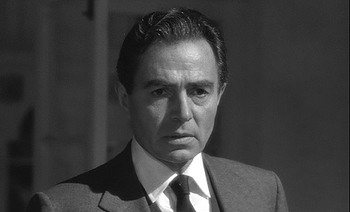 |
Shot 78 | Shot 79 |
 | 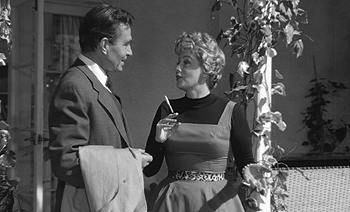 |
Shot 80 | Shot 81 |
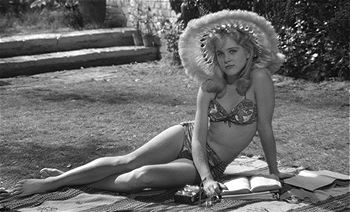 | 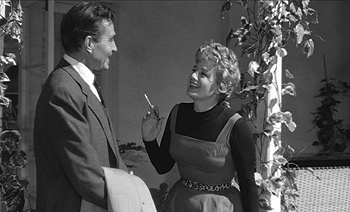 |
81 MS Humbert and Charlotte. (18:26)
CHARLOTTE: Thank you. What was the decisive factor? My garden?
HUMBERT: I think it was your cherry pies.
82 MCU Lolita. (18:36)
Charlotte laughs.
A problem with even beginning to try to compare Kubrick's Lolita to either Nabokov's book or his screenplay is resemblance is strained due the disparity in Lolita's age. A Lolita of twelve is not a Lolita of fourteen, as was Sue Lyon. In the book, Humbert was a pedophile/hebephile, attracted to girls from about age nine to fourteen, fourteen being the far limit. It's never made clear in the movie the age range of Humbert's attraction, but Kubrick's Lolita is fourteen, and though fourteen is certainly a child, those two years cause chaos in a society that says one thing about appropriate sexual age boundaries, but in which it is standard operating procedure for young teenage girls to be sexually harassed on the street for having graduated to puberty, and the Lolita of the film was clearly pubescent. Most women will have numerous stories of having been barely twelve or thirteen when they become magnets for unwanted and abusive attention on the street, unable to walk a few blocks without cars slowing, tailing them, wolf whistles the least of it as they are often aggressively pursued, and then verbally abused and threatened with physical abuse when they rebuff or simply attempt to ignore the situation. In the real world, some manner of this would already be experienced by Lolita, just minding her own business walking to the store.
The advertisements capitalized on Humbert's attraction to the young female who has just bloomed and is conscious of blooming. The question "How did they ever make a movie of Lolita?" begs for people to come see and find out how salacious it may be. On the other side of town, across the railroad tracks, Peyton Place (1956) depicted a teen who is raped by her step-father and kept this secret from a critical society that often held a female victim as liable and thereafter tainted. To support her vindication, the victim was portrayed as hyper-responsible both in school and at home, a good girl above reproach, while the rapist was an overtly contemptible, problematic drunk, and the family was lower class, residing in poverty. Middle class Lolita is her step-father's sex slave, but Sue Lyon and her candy red, heart sunglasses, sucking on lollipops in publicity photos by Bert Stern, is represented provocatively and sexualized. No one, for an instant, could look at those photos and not see the symbolism suggested in the props, enhanced by the direct-eye gaze. They were images that were half and half, just as adolescents are half and half, becoming adult but are still children, tormented by hormones, seeking independence and knowledge of their new selves and the world, experimenting with sexuality, but are also decidedly powerless and vulnerable children still reliant on adults for emotional and physical support and guidance. The iconic shot of Sue in heart-shaped sunglasses, red lips sucking on the red lollipop, tore the young adolescent straight down the middle between being innocent child and not-very-innocent jailbait. The kind of girl of whom many men have said was the seductress, older than her years.
But I have also heard and read individuals speak of the seductive eyes of younger children, misappropriating to them adult sensibilities and apprehensions.
Humbert (and others) would argue that Lolita's forbidden status is a matter of time and place and culture. Humbert holds up Poe's relationship with his Virginia, his cousin, who he married when she was just thirteen, as an exonerating example, but even Poe, despite having Virginia's mother's consent, was concerned and lied about Virginia's age for the marriage certificate, giving her as twenty-one.
Lolita's like a slippery pea that keeps escaping one's fork. She is a minor and a victim. But, oh no. Because she was already not a virgin in the book, because she initiated some manner of game with Humbert, which led to sex, she is declared as having agency and the fork spears her. This is the poster Lolita that beckons an audience to the theater.
In Mexico, to where Humbert and Lolita were eventually headed, in some places the minimum age of consent was twelve years of age. I read on Wikipedia that in the United States, in 1880, the age of consent was an astonishing ten in most states. However, in my experience, comb through census records and genealogies and it's pretty rare you'll find any girl under the age of eighteen marrying. I have a great-great-grandmother who was married at the age of fourteen to a nineteen-year-old male who had two sisters who both married at the age of thirteen to men in their early twenties. My family genealogy goes back generations on all sides and this was such a radical exception to the norm that I wonder what in the world was going on with these people. This was in post Civil War America, in Kansas, and is tantamount to marrying off little Laura Ingles in the 6th or 7th book of the Little House on the Prairie series. No one expects that. Try to visualize Little Women beginning with Meg, Jo, and Beth being married and consequently the bulk of the book concerned with them comparing pregnancies.
The legal agreement for individuals possessing the maturity to vote is now eighteen, and to drink is now twenty-one. The legal age to drive is typically sixteen. Society concedes that youth hasn't the maturity for appropriate decision-making on an adult level until the age of eighteen. But in twentieth century America, the tantalizing teen paired up with the much older male has been not only well-worn comedic material, but also provided serious contenders for true romance.
She may have been seventeen, but 1947 had Cary Grant, age forty-three when the movie was released, comically fending off Shirley Temple, a fervently devoted teen, in The Bachelor and the Bobby Soxer. Shirley Temple had been America's little angel for years. In this case, the film never considered Shirley, almost of college age, to be suitable material for a romance with a man old enough to be her father.
Again, she may have been seventeen, but 1954 had Debbie Reynolds as a juvenile delinquent, in Susan Slept Here, pursuing fifty-year-old Dick Powell in another comedy. She, in her ernest and abiding love, won out over Dick Powell's twenty-something girlfriend who was of course more concerned with money and status than real love. The teen girl's love, in film, was portrayed often as the real, pure thing, whereas even a slightly older woman with a few more miles had settled into dishonest wiles. More than a few movies had older men saying, "No, no," to a lovesick teen, and by film's end had been educated they were the prejudiced, self-denying ones, not giving the young girl credit for the validity of her feelings, uncomplicated youth bearing the grail of the truest and purest of loves.
Woody Allen's Manhatten is a sterling example of this. Seventeen-year-old Mariel Hemingway is not only sleeping with Woody Allen, who is forty-two and saddled with two ex wives, she is crawling all over him for great sex because her three prior relationships have been with stupid, inexperienced boys. Her love is the purest of loves not yet twisted by years of adulthood, while Woody is the immature one for eventually feeling guilty about the age difference. When I saw the film at the age of, I guess, twenty-one, I may have been won over by the glorious romance of the opening shots of New York, but I was infuriated by the myth of the so profoundly mature high school senior, whose parents, it seemed, were perfectly okay with her relationship with the far older, twice-divorced Woody. She didn't strike me as a real person but a fantasy, and I was aware the only reason she was depicted as the mature, clear-eyed individual was to excuse the desire and behavior of the dominant male. I may have left home at seventeen but I was well aware of the power imbalance of older men and younger women, of how younger women were used, and steered clear. As a teen I had known peers who were in relationships with older men, and maturity had never struck me as being characteristic of them. Instead they were always girls who were being manipulated. That Woody didn't even have Muriel being sent off by her parents to her great opportunity in London, instead having her parents already in London, reserving that good-bye moment for Woody and Muriel alone, was because to have all four of them standing there together would have blown his fantasy sky high. Though jokes were made in the film about Woody being older than her father, the jokes were not so much intended to point out the absurdity of their relationship, but to ultimately win the audience over to believing that young Muriel was the one with the power, not poor, decaying, neurotic Woody, and if there was anything that might stand in the way of this true and uncorrupt love it could only be misbegotten bad faith and a bowing to society's reluctance to accept their relationship (though, if I remember correctly, most everyone in the film did accept it).
In 1958, Maurice Chevalier was singing "Thank Heaven for Little Girls" in Gigi, and though no definite age is given for her in the movie, in the book she was fifteen going on sixteen when she went into training to be a professional mistress. Enough history can be gleaned of many "muses" of artists to know it's not uncommon for them to come from a harsh background and be prostituted out by the age of fourteen or fifteen, and if they were lucky they instead were set up as mistresses.
1943 found Joan Fontaine, in The Constant Nymph, ably playing a fourteen year old in love with a composer who marries her older cousin, but very quickly he comes to learn that it is little Joan who really knows his heart and soul, who really understands him and his music, and he realizes that it is she he has always truly loved. The young teen's absolute devotion and singular focus on her hero, the same that fuels fan clubs, was preferable to the composer over a mature woman's resistance to that brand of absolutely self-sacrificial constancy, and ultimately to the audience as well. But the age gap was still a problem, the girl being only fourteen--for reason of which she had to die. She was already preparing to leave town, traumatized at coming between the composer and his wife, but she breathed her last in a gentle, some kind of heart problem manner, as, in death, the film could then end with the pair depicted as bound eternally, spiritually. Profoundly creepy for some people (like me, though I appreciated Fontaine's acting). Others get swept away by the spiritual end and weep.
Kubrick directed Kirk Douglas in Spartacus in 1960. In 1961's The Last Sunset, Kirk Douglas meets an old flame in a Mexican town, a woman he had an affair with sixteen years beforehand when she was about sixteen. Belle's daughter, who would be about fifteen, portrayed as a child, falls for him. It's coming of age time for Missy. She dresses up in Belle's old gown, one her mother had worn when romanced by Kirk, and announces to Kirk her love. At first Kirk pushes her away, protesting she should be with boys her own age, but is quickly captivated (a couple of minutes pass at most) and insists he is the only one for her, the love of her life. When Belle learns of their plans to run off together, she reveals to Kirk that little Missy is his daughter. Uh-oh. In 1943, Joan Fontaine had to die as the fourteen year old in the love affair with a married man. Now, it is Kirk who commits suicide for sake of his daughter, allowing himself to be killed in a gun battle. Still, it isn't Missy's age that is the problem. It is the fact they were unwittingly father and daughter, though Belle proposes he was attracted to Missy because he recognized himself in her.
The older man paired with the young woman or girl was often a trade off between the older man getting a second lease on life, rejuvenated by her, and the younger woman getting money and status in exchange for the purity of her love and her enthusiasm for life.
Sometimes, however, the younger woman or girl was a user, as I've discussed in Portrait of Lolita, and the morally corrupt femme fatale, who has no love for the older man, ends up murdered.
Lolita is fourteen in Kubrick's film, so perhaps I shouldn't be pulling in movies about seventeen year olds who are almost legal material for May-September or May-December relationships, and I don't care about legal age consensual sex. Except all of the above stories did involve a minor female.
Let's turn back to twentieth century real life and some things that were going on about 1962 in the ball park of the fourteen-year-old age range, using celebrity land stories, because those are the ones we know about.
In 1958, Jerry Lee Lewis, at the age of twenty-two, married (his third time down the aisle) a thirteen year old who was the daughter of a cousin. The news was that she was fifteen, and I don't know if the public knew differently. It was scandalous, but she was also his cousin, which was part of the scandal. By the way, Myra now says she had long waited to be married and a mother, that like all teenagers she thought she was grown up. "I was that stupid.". Here they are, in the below video, not long after they were married. When they tied the knot, it's said she still believed in Santa Claus. She also seemingly told reporters, "You can marry at ten if you can find a husband."
About 1959, Elvis Presley met Priscilla, who was only fourteen, and began courting her. The PR was "chastely". She was fifteen when she moved into Graceland.
Over in England, with the 60's, Jimmy Saville began his decades-long career of sexual abuse, often of young teens. The public didn't know about it though for many decades. Not until he was dead and then it was okay to break the story.
In America, we were entering the rock-and-roll tour era of groupies, and a number of those girls were very young. Two of the famous, so-called "baby" groupies were Lori Maddox and Sable Starr. Sable Starr was apparently thirteen when she became a groupie, having sex with Iggy Pop at that age. Lori Maddox was reportedly fifteen (more likely thirteen or fourteen) when she reports herself as having first had sex, which happened to be with David Bowie. She reported it as an excellent experience. After this, she was either fourteen or fifteen when she hooked up with 29-year-old Jimmy Page for a year-and-a-half "romance" that commenced, after her self-reportedly rebuffing Page, with his tour manager "kidnapping" her and taking her to his room.
It was dimly lit by candles...and Jimmy was just sitting there in a corner, wearing this hat slouched over his eyes and holding a cane. It was really mysterious and weird...He looked just like a gangster. It was magnificent. Can you believe it? It was just like right out of a story! Kidnapped, man, at fourteen!...And that was the beginning of our romance. We like fell in love...We were madly, madly in love. It was like a fantasy or a fairy tale. But the others were really against me at the time. They were concerned because somebody warned them that if Jimmy was discovered with a fourteen-year-old girl, he'd be deported immediately. So Jimmy kept me locked in the room at all times. Both Peter Grant and Richard Cole insisted that I be kept locked up. They didn't let me go anywhere because I was so under-age...Jimmy met my mom and everything. He called her one day and said, 'I hope you don't mind that I'm seeing your daughter.' He was a real gentleman, and she knew that he was a really respectable guy and that he had money and, I mean, what is she gonna say? You know, she knew I was doing it anyway, so she figures if I'm gonna be doing it, who better with?
I mean, he was a real romance. He's the most romantic person in the world. He's so sweet and gentle...He'd give me presents, like an old scarab necklace to keep away evil spirits, and I'd give him like an antique music box or something. It was real sweet. And it was really an innocent, beautiful perfect love, you know? Like he knew I just loved him for himself and nothing else...
This ended real well with Lori when, eventually rejected, disconsolate and angry, physically fighting with her rival, Jimmy laughed and reportedly said she was too young to know how to mix fantasy with reality.
Which is the problem. Emotional maturity is sporadic and hard to come by in adults, much less fourteen year olds. Not to mention the power differential, the emotional and mental maturity of teens is a serious liability for them when mixing with the adult world, as evidenced in the real life situation of Lori Maddox who was kept hidden in hotel rooms and honestly believed hers was the romance of the ages, just like out of a fairy tale.
However these girls came about doing what they did, they were certainly used and abused but saw themselves as special and report themselves as willing, even despite a purported "kidnapping". They were famous and broadly received. How many were not so famous?
The "baby" groupies of the music world are especially relevant as Lolita, along the way, becomes a willing "groupie" of Quilty. Not only is there the assumed prestige of the fan garnering the attention of the celebrity, he promises her stardom in Hollywood.
Society says, "No!" And society says, "Yes!" I'm not going to get into the problem of underage prostitution, but there's that as well and I wanted to at least mention it. 200,000 to 300,000 children are estimated as being prostitutes in the United States alone. When I was about fourteen I was standing in line excitedly waiting for an Orange Julius when a man who was probably in his forties approached and asked me how much. I was stunned, offended, perplexed as to why he would think I was a prostitute. I also wondered if he was an undercover police officer. Whoever he was, he'd ruined my afternoon and my Orange Julius. I felt like a little fool for having been standing there just thinking about how great an Orange Julius would taste. I felt like a fool for having been taken off my guard. It never occurred to me to yell out to the surrounding customers and employees, "Hey! This guy is trying to buy a minor!!" It felt so grotesque that all I wanted to do was escape the experience. I didn't want to cause a scene. Plus I'd already come to expect to have my experience discounted, it didn't matter, and expected more of the same.
Everyone has difficulty with maintaining their own agency in situations with significant power differential, but with children and adults this is especially the case. Children may not know when boundary lines are being crossed, and even if they do they have a difficult time saying no to an elder. An anonymous survey of fashion models reported that about 55% began working between the ages of thirteen and sixteen, only about 37% when they were seventeen to twenty and only about 7% when older than twenty-one. Ages were not given but about 30% respectively had experienced inappropriate touching on the job and being pressured to have sex with someone at work. Over 86% were asked to change nude without advance notice and over 27% posed nude as they felt they had to, even if they didn't want to do so. if it seems odd that I went from a paragraph on prostitution to the fashion industry then google modeling and sexual abuse of minors or prostitution.
Children do not have agency.
Children often don't realize they don't have agency.
It's true that some girls do equate the forbidden, secrecy, and even abuse, with love. More than a couple of times, as a teenager, I found that I, in an outing with a friend, was nothing more than a cover story. Though I'd believed we'd planned to go to a movie, the real purpose of the outing would be revealed to be a meeting with her older boyfriend, usually in his early to mid twenties, which is a broad gap when one is thirteen or sixteen. I would be told it was real love, which must be secret for now. There was the age factor, no one could know about it as the girl's parents wouldn't approve, but sometimes there was a complicit reason for secrecy, the secret boyfriend's excuse being another girlfriend whose fingernails were still stuck in him, but just wait, just wait, like married men who say wait for the divorce. Shiny "pre-engagement" momentos would be shown me. A slip of a gold ring with a little stone, worn only at school. A little gem stone pendant on a necklace beneath the shirt. "You're naive, he's using you," I would think. And there were instances of tearful phone calls about how the boyfriend who gave her the baubles was making a girl do things she didn't want to do and if she didn't do them she would be roughed up, yanked around by her hair, struck. She would be called a whore and a slut. When thirteen, I chose to tell on a friend who was in such a relationship because she would call me about how the boyfriend was abusing her, would start talking about suicide, and would pass out on opioids while we were still talking on the phone. I didn't divulge the relationship she was in. I just told her mother I was scared because I was afraid she was going to overdose. We never spoke again.
Then there is the idea of the older male artist and his young female muse, and that of the learned older man being sometimes a sophisticated bridge from adolescence to adulthood, educating intellectually and aesthetically and the sexual relationship being part of it, the professor and the student, the instructor and devoted protégé.
Peter Sellers, after winning Lolita as a playwright, in 1964 was a famous pianist pursued by two fourteen-year-old fangirls in The World of Henry Orient. The antics and mindsets of the girls were decidedly teen and Sellers' character was horrified. But not so the director, George Roy Hill. The 44-year-old married man with 4 children seduced the sixteen-year-old Tippy, who played the troubled teen of the pair, and carried on an affair with the high-school senior for months before she came to the decision it had to end. Decades later she described herself as having been sexually innocent, naive, isolated, and overwhelmed by the director's fame. She didn't count herself as a victim but the emotions she had when being seduced tell a different story.
We fell in love during the filming of the World of Henry Orient and remained so through most of my senior year in high school[actually, the story goes, he had lunch with me every day starting during the rehearsal period to win my trust and calm me down and gradually gradully we developed a strong bond. he was one of the only adults that sanctioned my personhood ever, my family was so competitive and I was the daughter. We stared filming in June, I got more and more used to the camera as time went by, never comfortable, never really confident, but had begun to be able to think abit after the terrifying ACTION. So, it was August, I was in his office, a basement cement block room reaking of lysol, the whole place reaked of lysol except the soundstages which reaked of aerosol--movie making wasn't the healthiest environment, having the framiliar lunch, suddenly he jumped up, I can't remember what we were talking about whether there was some sort of creciendo or if it was apropos of nothing, and came over to me saying he was going to teach me how to french kiss, and started to kiss me in this most passionate way-agressive-serious sloppy way. I know I had a second to react, a world of thought rushed through my mind, a jam of screams and curiosity, resistance, fear. How could I refuse him? the director, he had become the only person in the world I depended on for validation, he made my performance in the film possible, how could I turn him away? Risk the loss of his support, admiration? I was 16, and not the worldly 16 that is so often depicted now or then. I had never had a boyfriend, was so shy I could hardly speak to the soft spoken ladies in the library...It happened, he Kissed me, and that line was crossed. To this day I wish he hadn't or that I had been able to be firm in a self protective way, but I didn't know how. On the other hand, these things happen at some point. That it was him for me was so intensely romantic and profound. I loved him, he loved me, I believe. It had no future. There was no marriage there. I would never want to ruin his family. The secrecy nearly killed me, and the controversy. No turning back, very tough to go forward...It feels wrong to be writing about it even now. He took me to the the Gugenheim, to my first Charlie Chaplin movies, took me to see Elvira Madigan, after which I couldn't speak for a good 15 minutes, he watched anxiously. He was so smart and funny and interested in me, for the first time in my life an adult wanted to know what I thought about things, watched me for reactions. I guess everyone's first love feels like that, but Mr. Hill was such the accomplished man...It was one of the huge events of my life. And because of the enormous secrecy, having to keep it from my parents, the effect it had on me as a person, my connection to the world was torn apart and I couldn't tell any adult why I was so changed, so rocked, so disaffected suddenly. It was very destabilizing. And at the very beginning of my "career".
She was sneaking away during trips with her classmates to NYC to museums to see him. That kind of thing. The power dynamic of the older man and the inexperienced teen, in what is viewed as a consensual relationship, couldn't be more transparent, how he knew what he was doing and how she hadn't a clue as to the full extent of the manipulation.
The seduction of the student by the mentor-teacher. I remember my first experience of this with a friend when we were fourteen (she may have been fifteen), both in training for years to be classical musicians. She was shy, delicate, showed no interest in boys, seeming entirely disinterested in anything but practicing her instrument, her chaste profile captured as if from a John William Waterhouse painting, loose brown tendrils of hair framing a somber profile. She didn't look so much like a Botticelli as a somber, withdrawn teen-aged Virginia Woolf. Then she revealed to me one day she had been sexually active for a while with her music instructor. She was "special", and their relationship was comprehended as a special and beautiful one touched with the holy, golden glow that came with sexual subservience to the arts. Initiated into the mysteries, she could bring that passion to her music, or so she was told. (Speaking of Virginia Woolf, she said her half-brother, George Duckworth, abused her, but biographers excused this as fantasy thinking on her part, reasoning she desired George so she imagined he abused her.) Then I met another young teen who had been sexually involved with her instructor, but she wasn't a romantic and behaved as though the sex had been just another one of so many exercises to be practiced and was no big deal except for the fact that she'd reached an awareness that maybe it shouldn't have happened. No red lollipops and no red heart sunglasses, these were careful girls who would rouse no suspicion. No shiny pre-engagement momentos were involved. Art was all.
[NOTE: While doing an extensive rewrite of this post, it was at this point that I became really depressed, thinking of all the abuse out there I'd encountered as a young teen, and our code of silence, and had to stop working on the rewrite of this page for a few weeks.]
Despite the ad campaign, Kubrick's film is partly a parody of both the comedic jailbait (or near it) and dramatic society-won't-accept-our-love tropes, as well as as a parody of the old style tear-jerker romances, one of the two main, musical themes being the dramatic style associated with overblown melodramas, a musical style that was dying out, and the other a fresh and jaunty, adolescent pop tune that would be covered by the Ventures. Lolita, who has photos of Hollywood stars papering her walls--the industry desiring adolescent fixations that translate into sales--is attracted to Quilty in the fan girl crazy way that she says the rest of her peers are, and then is problematically presented as willingly consummating a relationship with Humbert. But my read on the film is that it's a deadly serious parody that pokes at society's predilection to see the girl as a femme fatale. We are shown how fatherless Lolita does actually look upon Humbert as a father substitute, but she has no clue how to properly relate to him as her mother treats her as a sexual rival and also due Humbert's signaling his interest in her. Lolita's father died seven years beforehand, and though the age difference between her parents in the book was twenty years, the picture of him that glowers out at us in the film is of a man who was far more than old enough to be Charlotte's father when they married, so Lolita has daily observed that photo and absorbed the older man as romantic partner. We are never told how old Charlotte was when she married but she describes herself as having been a baby with no knowledge of the world, which is why she credits Humbert as being able to fool her as he did. The mother-daughter relationship strained, Lolita has a number of reasons for wanting to get back at her mother through Humbert, and after having been introduced to sex at camp she knows how to do it. However, sex also has no meaning for her other than as a naughty game. She is not the femme fatale. She's a young teenager with a man who was ready to kill her mother to get to her (though she doesn't know this), who unexpectedly finds that her mother is dead and that Humbert is stepdaddy and all she's got left in the world. He is her guardian. She believes that if stepdad Humbert abandons her she'll be put in a juvenile delinquent facility (in the book Humbert tells her that she is a juvenile delinquent and what will happen to her if she tells anyone about them). This is a child who, before she learns her mother's dead, is focused on malts and fries, and afterwards only knows to ask if she can have her record player and records from home. She's held prisoner, used as Humbert's sexual slave, and finally really comprehends his desire for girls her age and taunts him that he can't get his hands on her friends, which is to demean herself and fully acknowledge her own position. When she's offered an escape route, which she seizes, it's through another abuser who she idolized and knows to be idolized by others. She hopes he will be better than Humbert. When she and Humbert last meet, she is so clueless she even apologizes to Humbert for cheating on him, that's how screwed up Lolita is, and how little she understands about what has happened in her life, and the fact is she's going to understand very little as a product of her environment plus the times. It's made very clear that, calling on Humbert for help, she perceives him as dad, and is even concerned about hurting him. And if she sees him as dad at the film's end, that clarifies how she has related to him throughout. He was dad, though a stepdad, with whom she is forced to have sex. While kept prisoner by him, she helped him hide what was going on from the world as she didn't want to get in trouble for being bad, and she still hides it, even from her husband, perhaps because she wants to repress the past but also because she worries about being seen as a bad girl juvenile delinquent. She is so young, immature and jaded as to say that Quilty was the only guy she was ever crazy about (perhaps because she first related to him as a teen fan to a demi-god celebrity), despite his having abused her. Has she been thirteen or fourteen years old ten years later she would have been kidnapped to Jimmy Page's hotel room and thought it the advent of a marvelous love affair.
Nabokov did want and expect Lolita to be portrayed differently from the Lolita Kubrick depicted. In the book she was about 4 feet 9 inches tall and weighed 78 pounds. That is a young child. That is not an adolescent with breasts, hips and a menstrual period. Nabakov wanted her at least grubby and childish in the film. Instead, Kubrick gives us a more polished Lolita in make-up, nylons and heels, a child who is being educated by society for her future station as a (likely married) woman, but it is all imitative womanhood at this stage, mimicry, So, we need to give up the idea of Lolita being twelve and barely pubescent, for Kubrick has, whether due his worries over censors or because he was interested in parodying and playing with the hypocrisy inherent in the teen girl trope. But whether she was twelve or fourteen doesn't much matter, though an adolescent Lolita is more acceptable to the public than a prepubescent Lolita, for they are both minors, and both are prisoners.
In an interview, Kubrick once said, "Because of all the pressure over the Production Code and the Catholic Legion of Decency at the time, I wasn't able to give any weight at all to the erotic aspect of Humbert's relationship with Lolita, and because his sexual obsession was only hinted at, it was assumed too quickly that Humbert was in love. Whereas in the novel this comes as a discovery at the end." I've difficulty believing he would have later dealt with Humbert and Lolita in a much more explicit way than in 1962, because as close as he ever got to erotic was in Barry Lyndon, and that wasn't much.
As for whether or not Humbert was really in love with Lolita by the end of the film? Did Kubrick believe Humbert truly discovered, at the end, he was in love with Lolita?
This section has been extracted to a longer post, at this link, on the problems with discussing Lolita, and the movie having been sometimes promoted as a love story.
The underlined dialogue being what was drawn (paraphrased mostly) from Nabokov, in the film we've the bare bones in Nabokov's treatment of Humbert's arrival in Ramsdale and that's about it. He was to have stayed elsewhere but that house burned down. Kubrick adds humor, a visit to Charlotte's bedroom, the shrine to her husband, the discussion on art. Quilty did not address her club, speaking about Zhivago and Schweitzer, instead it was another person.
Kubrick even discarded Nabokov's description of Charlotte's garden as having lilies, and exchanged them for yellow roses. The rose adorning the back of Charlotte's dress at the Summer Dance will likely be yellow as well.
Nabokov pays attention to name origins. Charlotte is the feminine of Charles which means "free man". Kubrick iterates this for us with the inclusion of "the declaration of independence". Independence was mentioned in the introduction with Quilty saying he was Spartacus and asking if Humbert was there to free the slaves.
Nabokov specified that a reproduction of Rene Prinet's "Kreutzer Sonata" be in Humbert's prospective bedroom, by which Humbert would be repelled. I read that the painting, depicting a violinist grasping up a pianist and giving her a kiss, was once considered as immoral, promoting immoral values. Leo Tolstoy wrote "The Kreutzer Sonata", named after Beethoven's sonata, and is a work in which the main character addresses the question of "what is love" when a woman insists marriages shouldn't be arranged but be based on true love. The main male character, in response, holds that love passes quickly, complains women dress to arouse lust and that there won't be sexual equality unless women are no longer subjects of desire and men no longer manipulated by carnality. The character does marry, then kills his wife when he believes that she has an affair with a violinist. Due his profession that she committed adultery, he's acquitted, then "rides the trains seeking forgiveness from fellow passengers" according to Wikipedia. I've not read the book.
The Mexican art work that Charlotte says she's asked Lolita to keep in her room, in the Nabokov screenplay was instead...
...a painted screen...pictured on it is a nymphet in three repeated designs: (1) gazing over a black gauze fan, (2) in a black half-mask, (3) in bikini and harlequin glasses. There is a rent in the fabric.
Kubrick dispensed with the nymphet art and instead made it Mexican. Rather than the nymphet there is a man in the sombrero in the doorway. He relates this to Lolita with the wide-brimmed hat she wears upon their meeting. He has transferred the bikini idea to when Humbert first meets Lolita, for Nabokov had asked that she be instead portrayed as observed by Humbert in this way:
From a mat in a pool of sun, half-naked, kneeling turning about on her knees, my Riviera love was peering at me over dark glasses...As if I were the fairy-tale nurse of some little princess--lost, kidnapped, discovered in Gypsy rags through which her nakedness smiled at the king and his hounds, I recognized the tiny dark-brown mole on her side.
Lolita is not in gypsy rags, which was how Lewis Carroll/Charles Dodgson photographed Alice Liddell.
Annabel was the name of a twelve-year-old girl with whom Humbert fell in love when fourteen. They didn't consummate their relationship, though not for want of trying. Then she died. Nabokov has pages upon pages on this back story and others, such as his wife and their divorce, Kubrick discarding nearly all of it. Humbert seeks to blame his predilections on this lost child love, and Kubrick, I do believe, makes a veiled reference to her in the next section.
I've written elsewhere in my Kubrick analyses on anamnesis in his films and his version of Nietzche's "eternal return", which is tied in with the anamnesis. With Nabaokv, Humbert's immediate "recognition" (as he describes it) of Lolita is his expression of anamnesis, of the eternal return. Annabel has appeared again in his life.
Charlotte's garden would be an obvious reference to the paradisical garden of Eden, which belonged not only to Adam and Eve but to Lilith. In section three, I discuss Lilith.
So, that's a no-brainer. The garden comes with temptation. The knowledge of good and evil.
Nabokov, in an interview, admitted to Harold Haze's name being a play on the German word for hare, which is hase. So, Harold Haze's name has a hidden double. Har (as in hare) - old + Haze (German for hare). I would take the "old" as referring to Harold's age, for we know from the wonderful picture of him, presiding as a god above Charlotte's icons, staring always at the viewer, that he was much older than Charlotte, so they had themselves a kind of spring and winter relationship.
83 Cut to the monster ripping off the bandages around its face in the 1957 Hammer horror film, The Curse of Frankenstein, the camera zooming in. (18:41)
Shot 83 | Shot 84 |
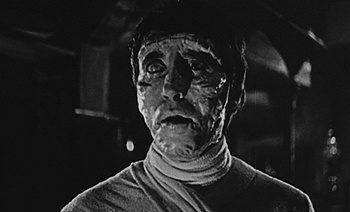 | 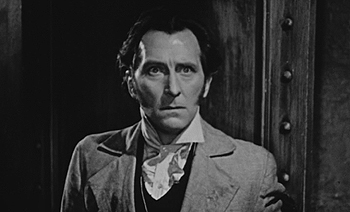 |
Shot 85 | Shot 86 |
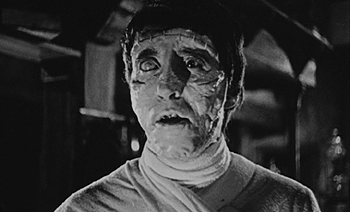 | 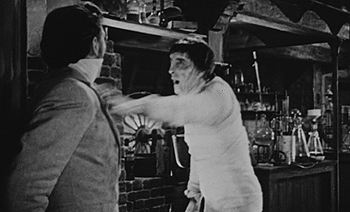 |
84 Cut to Peter Cushing/Frankenstein. (18:43)
85 Frankenstein's monster (Christopher Lee). (18:46)
86 MS of the monster grabbing Victor baron Frankenstein. (18:48)
87 MCU Humbert in a car at a drive-inn between Lolita and Charlotte. (18:49)
MOVIE: No!
Sound of breaking glass.
88 MCU of Humbert's hands on his legs. With the mummy yelling, Lolita grabs one hand and Charlotte (hands gloved) the other. He slips his hand out from under Charlotte's. (18:52)
89 ...to scratch his nose. back to the MCU of Humbert between Lolita and Charlotte again. (18:58)
90 MCU of the hands again. Humbert places his left hand on Lolita's which is on his right. Charlotte has her hand on his left leg. (19:00)
91 MCU Humbert and Lolita and Charlotte, they reacting to screams on screen. (19:02)
Shot 88 | Shot 89 |
 |  |
Shot 90 | Shot 91 |
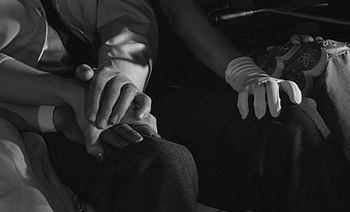 | 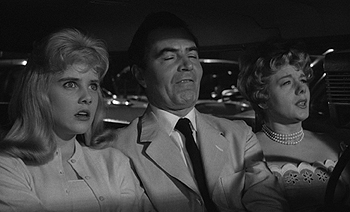 |
Shot 92 | Shot 93 |
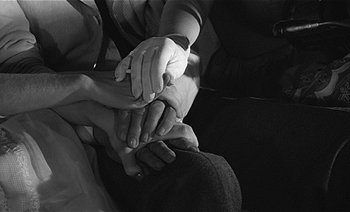 |  |
92 MCU of the hands again. (19:05)
Lolita places her right hand on top of Humbert's left so their hands are entirely stacked and intertwined. With a scream on screen, Charlotte swings her gloved hand over to grab for Humbert's and finds Lolita's on his as yet more screams sound.
93 MCU of Lolita and Humbert looking down at Charlotte's off screen hand. (19:11)
Charlotte glances over in confusion and they all release hands and return to concentrating on the screen.
Fade out to black.
During the hand claspings we hear, presumably in the horror movie, sounds of things breaking and screams, one particular loud and piercing one occurring as Charlotte finds Lolita's hand upon Humbert's. These were sounds scored by Kubrick. The action in the horror film throughout is the monster strangling Frankenstein, without much sound accompanying.Kubrickcast speaks of this in their podcast on Lolita, and that Kubrick inserted the screams for (if I remember correctly) an appropriate effect for a horror film as one couldn't very well have silence. But the screams also work well with the hand games going on and the horror of Humbert's pursuit of Lolita, which should be a substitute for Charlotte's state but instead, and at this point, she only is confused. The screams can also be a stand-in for what should be the audience's horror at Humbert's pursuit of Lolita.
We can't compare Nabokov's Frankenstein scene to Kubrick's as Nabokov had one neither in the book nor in the screenplay.
Perhaps of interest is that this Frankenstein feature is one that ends with the viewer being uncertain whether Frankenstein's story of the monster is true or not. He is in prison for the murder of his maid, Justine, who was killed by the monster, though with Frankenstein's encouragement as the maid had threatened to turn in Frankenstein for his evil experiments. When the monster then attempted to kill Frankenstein's fiancée, Frankenstein dissolved him in acid, leaving no proof he existed. Thus, Frankenstein is jailed for Justine's murder. Frankenstein confesses to a priest his story but his teacher and associate, Krempe, will not cooberate the story, leaving open the possibility that it is only the product of Frankenstein's imagination.
This ambiguity is much the same as we will have with Eyes Wide Shut, Bill left uncertain as to what actually occurred during his adventures, as well as the audience. We have some of the same ambiguity explicitly stated at the beginning of Fear and Desire, the prologue stating that the war that is fought in the film is of the mind rather than concerning any physical place.
Not included in Kubrick's movie, Nabokov had as an epilogue Lolita giving birth to a stillborn child and herself dying during birth. Mary Godwin Shelley, before authoring Frankenstein, had also had a child die, born prematurely, who managed to survive for two weeks. She soon thereafter had another, who was about five months old when she had the "waking dream" that became the foundation for Frankenstein and his monster. Some suggest that Mary's loss of her first child and her guilt over it was also an inspiration for the novel, others that Frankenstein's model was her lover/husband Percy who, having an affair with Claire, Mary's stepsister, went away with Claire for a day immediately after the infant's death. There are a number of theories--my interest here is that Kubrick has chosen to use The Curse of Frankenstein as the film seen by Charlotte, Lolita and Humbert, and that with Lolita we have the death of a child in the novel and screenplay, Humbert's first love, Annabel, while in Frankenstein we have it in the author's life.
In A Clockwork Orange Kubrick has, on one level, Alex being the necessary monster born of destiny (Christ needing his persecutor), and on another level played with Alex also being the monster child of Burgess, while Burgess himself had Alex Delarge finding "HOME" with the writer, Alexander, where he assaulted his father figure and raped his wife, again a kind of Oedipus who couldn't escape fate.
In 2001, HAL, too, is a kind of monster child of his creator humans, a twin who somehow goes rogue.
Even though we don't see the protracted scene of the monster strangling Frankenstein here, we may be reminded of it in The Shining when Danny is choked in room 237 while Jack has his nightmare--that strangulation being, again, an ambiguous event of which no one is certain as to the truth, but is forecast (for all intents and purposes) by the hotel's choking posters with the trapezoidal/pyramidal graphics. And in 2001, Frank Poole was, in effect, strangulated, deprived of oxygen.
So, the Frankenstein monster story has legs in Kubrick's oeuvre. We see it here introduced in conjunction with a version of the Frankenstein film that had an ambiguous ending, and which was also considered an example of degrading/demoralizing theater for its time, just as was the story of Nabokov's Lolita, and Kubrick's version barely slipped around the censors.
The pitiful nature of Mary's monster is that he is promptly rejected by his creator and is doomed to a self-loathing existence.
Who is the monster here?
That may be perhaps found in the name Christopher Lee. Annabel Leigh was Humbert's first love in the book and screenplay. Humbert attempts to pin on her all the blame for his sickness, his quest ever being for this twelve-year-old girl with whom he was in love when he was fourteen. Her name is an homage to Edgar Allen Poe's Annabel Lee. Christopher Lee, as the monster, seems to me to be a possible reference to Annabel Leigh, Humbert's monster, continually resurrected in his search for her in his nymphs, and finally Lolita.
94 Fade in to Charlotte and Humbert playing chess. (19:22)
CHARLOTTE: Now this is the one that goes back and forth.
She holds a knight.
HUMBERT: Yes, that can leap over the other pieces.
Lolita comes down the stairs in the background. The Lolilta pop music enters.
CHARLOTTE: It goes around corners. You're going to take my queen?
HUMBERT: That was my intention, certainly.
Lolita leans on Humbert's chair.
CHARLOTTE: Uhm, beddie-bye, dear.
Charlotte proffers her kiss for a cheek. Lolita reluctantly obliges.
LOLITA: Good night.
Lolita turns to Humbert.
LOLITA: Goodnight.
She graces Humbert with a more substantive kiss that should be obvious to her mother, is intended to be obvious to her mother, who either doesn't notice or pretends not to notice.
HUMBERT: Good night, Lilo.
She exits as Charlotte moves her queen in appropriately so it is poised for taking.
HUMBERT: That wasn't very clever of you.
He takes her queen with a knight.
CHARLOTTE: Oh, dear! Oh, dear! No!!!
HUMBERT (laughing): It had to happen some time.
Fade to black.
We can't compare Nabokov's chess scene to Kubrick's as Nabokov had one neither in the book nor in the screenplay.
We know Kubrick was a chess player. Nabokov was one as well. I've discussed this scene a little in my analysis of 2001, in relation to the chess scene there and the significance of the knight that moves around corners.
Here, the obvious significance of the taking of the queen is its reference to Lolita.
Lolita is being immediately and repetitively portrayed as in competition with her mother, and her mother even seeming to take advantage of Lolita's attracting Humbert into her home, while at the same time denying herself this knowledge. If I was Lolita, I'd be pretty bitter about that.
In the background we can see in this scene, as well as in others, the checked floor of the entry and hall. Seems it merited mention in this scene in particular due the checked board of the chess game.
The upstairs bathroom has a checked floor as well.
Refer back up to shot 64 for more on this and the hula hoop scene.
95 Extreme CU of Humbert's eyes gazing intently over the top of a book. (20:06)
Zoom out to show Humbert relaxing in a bathrobe on the stairs of the back porch, watching Lolita hula-hoop.
LOLITA: 31, 32, 33, 34, 35, 36, 37, 38, 39, 40, 41, 42, 43, 44, 45...
Charlotte appears through the door with a camera.
LOLITA: 46, 47, 48, 49, 50, 51, 52, 53, fifty...
Charlotte, stooping, takes a flash photo of the unsuspecting Humbert, who looks up in surprise, Lolita also stopped mid hula-hoop.
CHARLOTTE (happily, to Humbert): See how relaxed you're getting?
Fade to black.
We can make no such comparison as it wasn't in the screenplay. However, the scene is present in the novel. He's watching Lolita (no hula-hoop) and Charlotte takes a picture of him, but he was not caught unaware.
In the novel, Nabokov has Humbert playing with the idea of drowning Charlotte later during an excursion to Hourglass Lake, but at the last moment he decides not to do so, and a good thing, too, for he was unaware that they were being watched by Mrs. Farlow who almost put them in a painting--and here we have Humbert and Lolita oblivious to Charlotte sneaking up with the camera to capture a photo that should serve as testimony to Humbert's fixation upon Lolita.
The hula-hoop became an immediate craze in 1958 and so the audience would immediately identify with Lolita's playing with the hoop, but if we look back at the statue of the woman clasping the Spartan warrior at Quilty's, there be another reason for the choice of the hoop.
96 LS of numerous teens at the Ramsdale High School Summer Dance, coupled on the gym floor dancing. (20:31)
The camera zooms in on Lolita and her date, Kenny, also dancing.
LOLITA: Oh, there's mother. Let's go say hello.
Kenny and Lolita step over to Humbert and Charlotte at the buffet table, Charlotte fixing herself a hotdog.
LOLITA: Hi, mom.
CHARLOTTE: Oh, hello, darling. Oh, hello, Kenny.
KENNY: Good evening, Mrs. Haze.
CHARLOTTE: Oh, Kenny, this is Mr. Humbert. (She introduces the two.) Kenny Overton.
HUMBERT (shaking hands with Kenny): How do you do.
LOLITA: You having a good time?
CHARLOTTE (biting into her dog, affirmatively): Uh, hum...
LOLITA: Well, we'll see you then.
CHARLOTTE (mouth full): Uh, hum!
LOLITA: Bye-bye.
Kenny and Lolita dance back out onto the floor, the camera following them.
97 MCU Charlotte leaning on Humbert's shoulder, still holding her hot dog. (21:17)
They both gaze after Kenny and Lolita, he in dismay, she smiling.
CHARLOTTE: Oh, aren't they adorable together? I think tonight's the night.
HUMBERT: Huh?
CHARLOTTE: Well, Lolita told me that she's positive Kenny's going to ask her to go steady tonight.
98 MLS The Farlows advancing. (21:35)
JEAN: Hello, Charlotte!
CHARLOTTE: Jean! John! Hello!
JOHN: Hello!
John kisses Charlotte's cheek. Jean throws a kiss at Humbert.
JEAN: Hi, Humbert.
JOHN (wrapping an arm around Humbert): Sorry, we're late. I got held up in court. Well, the prosecution brought in some new witnesses, you know, and I had to sit down with my client (fixes Humbert's bow tie) and make sure we were prepared for tomorrow morning.
Arm wrapped around Humbert, he slaps his chest. Jean and Charlotte talking to the side, Jean interrupts.
JEAN: John, can't you stop being a lawyer for just one night in the week?
JOHN (grasping Charlotte by the waist): Mind if I dance with your girl, Hum? We could sort of swap partners.
HUMBERT: You're most welcome.
CHARLOTTE: Well, this is what you get (she places the hot dog in his hand) because you won't dance.
Charlotte and John dance away.
JEAN: Hi, Humbert.
HUMBERT (cleaning his hand): I'm sorry that I don't dance.
JEAN: Oh, that's all right. I don't like dancing either very much. Did you know that? You know, it's a funny thing, Humbert, but John and I first met at a dance, and I...I was sort of sitting it out, you know, and so he just sat it out, too.
HUMBERT: Oh, that's very romantic.
Shot 97 | Shot 98 |
 | 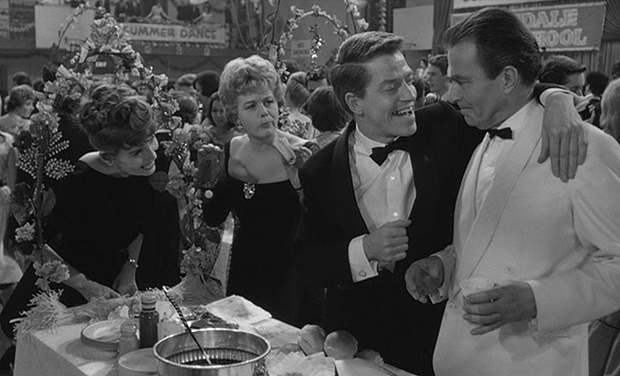 |
99 MS Mona Farlow dancing up next to Charlotte and John. (22:30)
MONA: Hi, dad!
JOHN: Mona, baby!
CHARLOTTE: Darling!
John kisses his daughter's cheek.
JOHN: How ya doing?
MONA: Fine.
JOHN: Mike?
100 MS Jean grasps Humbert's arm. (22:36)
JEAN: Humbert, don't tell Charlotte that I told you this, will you? But, did you know that you've had the most remarkable effect on her? Did you know that?
HUMBERT: I have?
JEAN: Uh-hum. Well, I know it's none of my business, but, well, she's begun to radiate a certain...glow?
HUMBERT: I hardly think that has anything to do with me.
JEAN: Humbert, when you get to know me better you'll find I'm extremely broad minded.
HUMBERT: Ooooh.
JEAN: In fact, John and I...we're...both...broad...minded.
HUMBERT: Oooh!
Shot 99 | Shot 100 |
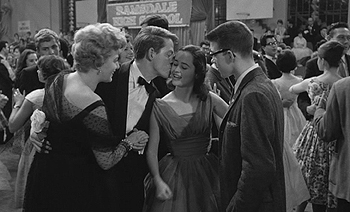 | 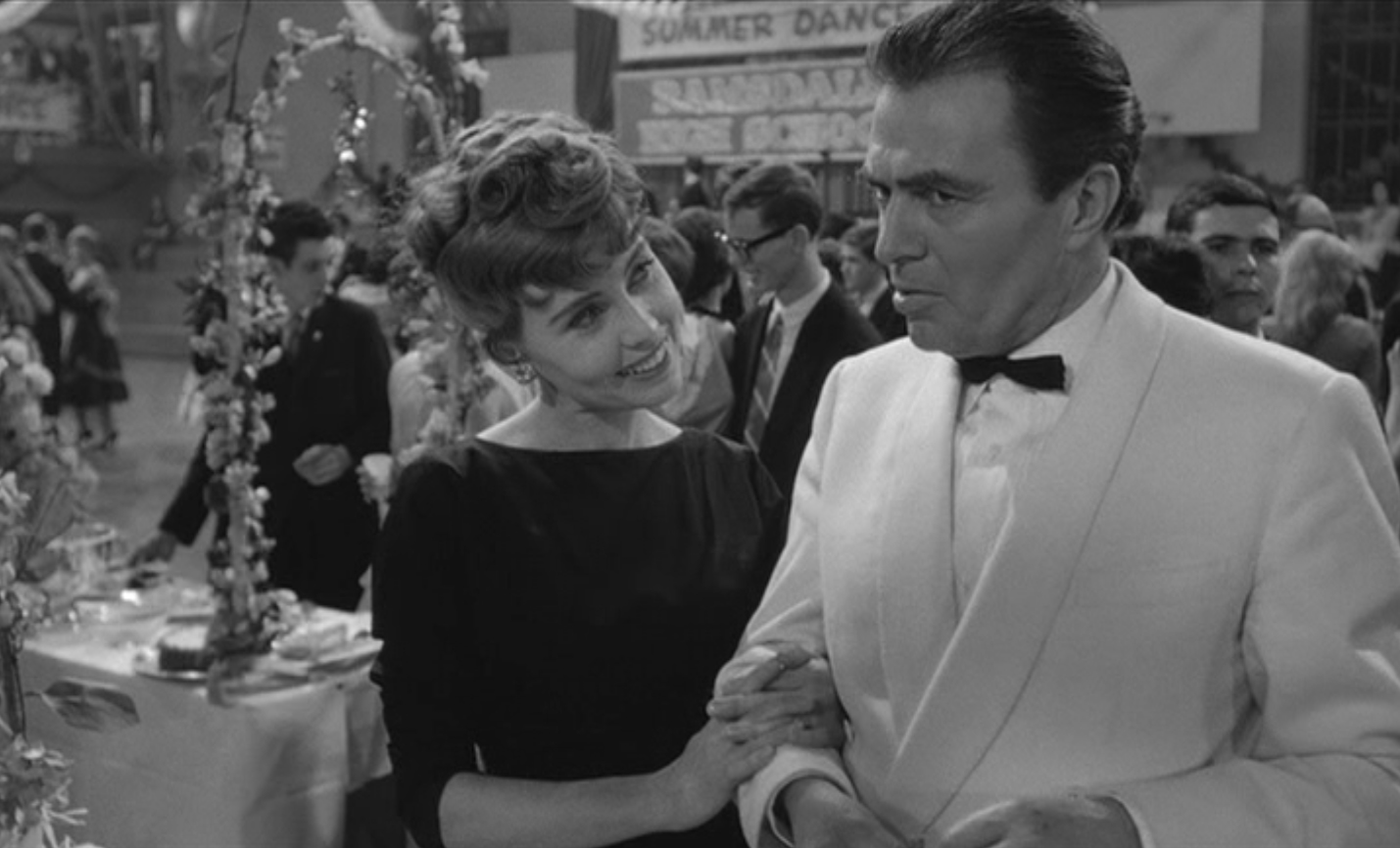 |
101 MS Charlotte and John dancing over to Jean and Humbert. (23:21)
JOHN (elbows Humbert): Heh, you two. Cut that out!
JEAN: Oh!
CHARLOTTE: I'm so thirsty. Let's all have a little punch now, huh?
Everyone reaches for the table.
JEAN: Oh, there aren't any more clean cups, anymore.
HUMBERT: I'll get some from another table.
CHARLOTTE: Thank you, Humbert.
Humbert walks away.
CHARLOTTE: Jean, your Mona looks simply enchanting in that cloud of pink. Oh, she's certainly becoming a mature young lady, isn't she?
JEAN: Yes. Where does the time go? Do you know this summer she's going to be a junior counselor at camp?
CHARLOTTE: No! That's simply wonderful. Are you sending her to that Camp Climax again?
The band ends a song and everyone claps.
JEAN: Well, of course. We've done it every summer, since she was ten.
JOHN: That gives Jean and me a chance to catch up on our homework.
CHARLOTTE: Oooh!
Shot 101 | Shot 102 |
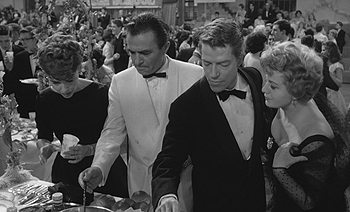 | 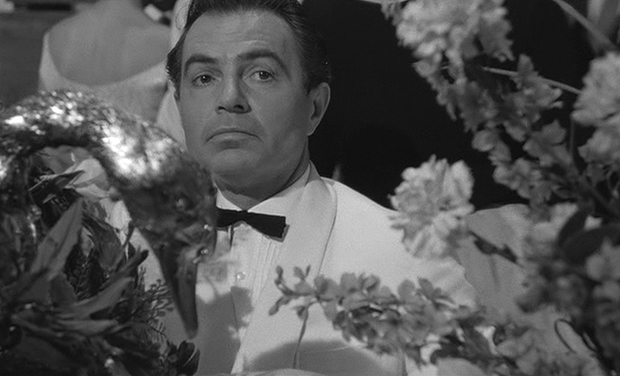 |
102 MCU Humbert. (23:59)
Having made his escape, Humbert sits down behind a golden goose and flower arrangement on a table so he can surreptitiously watch Lolita.
103 MS Lolita and Kenny dancing. (24:12)
104 MCU Humbert watches, peering around others. (24:18)
105 MCU Lolita and Kenny dancing. (24:24)
Shot 103 | Shot 104 |
 |  |
Shot 105 | |
 | |
106 MS Quilty and Vivian Darkbloom dancing. (24:30)
107 MLS Charlotte and John and Jean grab some chairs from some kids and sit. (24:41)
CHARLOTTE (sitting): Oh, excuse me, kids!
JEAN: Sorry!
CHARLOTTE: Oh, my feet are killing me! Oh, who is that?
JEAN: Who?
CHARLOTTE: There!
Shot 106 | Shot 107 |
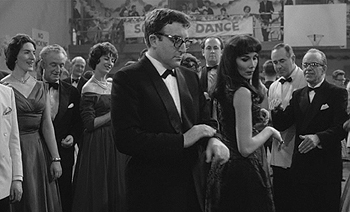 |  |
108 LS Quilty and Vivian dancing. (24:52)
109 MLS Charlotte and John and Jean. (24:57)
CHARLOTE: It's...it's Clare Quilty! You know, the TV writer?
Shot 108 | Shot 109 |
 | 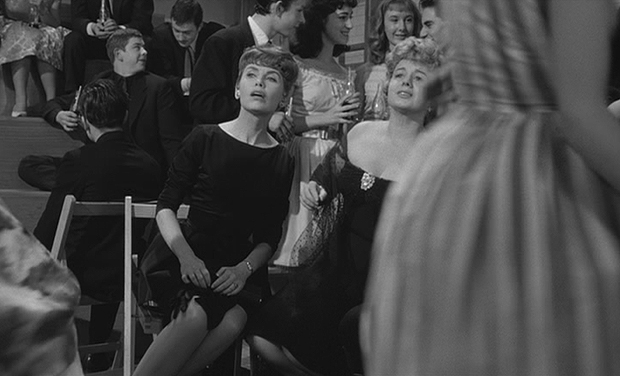 |
110 MS Quilty and Vivian. (25:01)
111 MLS Jean, Charlotte and John (25:07)
JEAN: I adored his play, "The Lady Who Loved Lightning". It was marvelous.
CHARLOTTE: Oh, excuse me, kids. I'm going to go over and say hello.
Shot 110 | Shot 111 |
 | 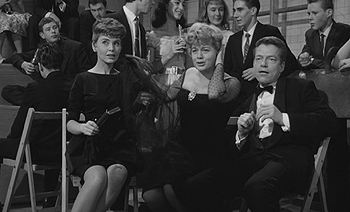 |
112 LS Vivian and Quilty. (25:17)
Charlotte makes an attempt to cut in and finally succeeds.
CHARLOTTE: Oh, hello! Hello, again!
Quilty stops dancing as Charlotte continues. The music stops and everyone claps. Quilty begins to walk off.
CHARLOTTE: Oh, wait!
113 MS Vivian lighting a cigarette. (25:44)
QUILTY (approaching): Wow.
Vivian turns her back to Charlotte, who pursues.
CHARLOTTE: Oh, it's certainly been a long time.
QUILTY: Certainly has, yes.
CHARLOTTE: You know that I've been the local authority on you ever since.
QUILTY: Is that so? Well that's very sweet of you. Thank you so much.
Shot 113 | Shot 114 |
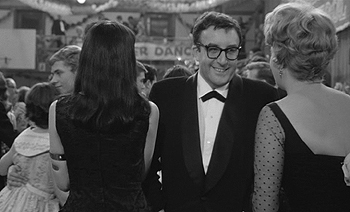 |  |
114 MCU Charlotte from between Quilty and Vivian. (26:00)
CHARLOTTE: I'll never forget that intellectually stimulating talk that you gave to our club.
QUILTY: Yeah, magnificent club, really magnificent. Tell me one thing, are you a columnist?
CHARLOTTE: No, no, don't you remember? Well, that afternoon...
115 MS Charlotte, Quilty and Vivian. (26:16)
CHARLOTTE: ...changed my whole life.
QUILTY: Oh...well, how about that.
CHARLOTTE: You remember?
She whispers in his ear.
QUILTY: Did I do that? Did I?
CHARLOTTE: And afterwards, I showed you my garden. And I drove you to the airport.
QUILTY: Yes.
Shot 115 | Shot 116 |
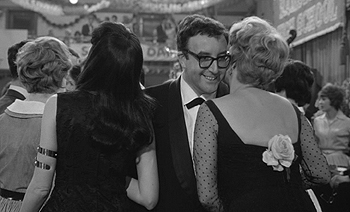 | 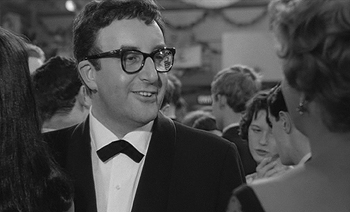 |
116 MCU Quilty from over Charlotte's left shoulder. (26:39)
QUILTY: Really great...fun. Listen, listen, didn't you have
a daughter? Didn't you have a daughter with a lovely name? Yeah. A lovely...what was it now...a lovely, lyrical, lilting name like uh...
117 MCU Charlotte from between Quilty and Vivian. (26:51)
CHARLOTTE: Lolita.
QUILTY: Lolita, that's right. Lolita, diminutive of Delores, the tears and the roses.
CHARLOTTE: Wednesday she's going to have a cavity filled by your Uncle Ivor.
Shot 117 | Shot 118 |
 | 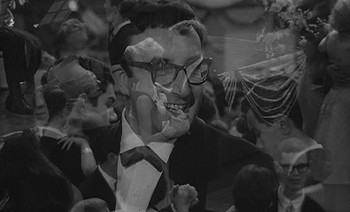 |
118 MCU Quilty. (27:02)
QUILTY: Yes. (He laughs.) Yes.
Crossfade from Quilty to Lolita and Kenny dancing.
119 LS Lolita and Kenny dancing. (27:06)
The camera zooms out to behind Humbert on the balcony, watching the pair by the stage at screen left.
120 MS of Charlotte bringing Humbert cake. (27:06)
Though the music continues over without a break, we now view Kenny and Lolita dancing at the rear of the dance floor, across the gym from the stage. They are viewed frequently from the balcony throughout the following.
CHARLOTTE (handing Humbert cake and punch): There you are! Where have you been? I've been looking all over for you.
HUMBERT: I strolled around for a while and then I came up here.
CHARLOTTE: Oh, you poor man, I bet you're bored to tears.
HUMBERT: On the contrary, I find it most interesting.
Jean and John enter from the right.
JEAN: Charlotte! Hello! Oh, Humbert, you found a place to sit down. Oh, gosh.
Behind Humbert's back, Charlotte mutely communicates to Jean with a glance at her wristwatch, and Jean glances at her own.
JEAN: Charlotte, Mona's having a little get-together later on at our house, and she and Freddie Beale and a couple of the other kids are having a jam session, or whatever it's called, anyhow, she wants to know if Lolita and Kenny can come.
CHARLOTTE: Well, I don't see why not. As long as you have her home by midnight, huh?
JEAN: Oh, but Charlotte. Tonight's a special occasion. Why don't you have Lolita stay over with Mona. I mean, John can bring her back in the morning, can't you, John.
JOHN: Oh, sure.
CHARLOTTE: Oh, now, that would be too much trouble.
JEAN: Of course not.
JOHN: It's the easiest thing in the world.
CHARLOTTE: Hmmm, well...
JEAN: It's settled.
All laugh, except Humbert, who is distressed.
JEAN: Well, I guess we better say good night to you two kids. John and I have to get home and kind of supervise things.
JOHN: You know, what she means is keep the lights on.
CHARLOTTE (laughing): Oooh!
HUMBERT (making to rise): I think we ought to come over and help.
JEAN: Oh, no!
John, Charlotte and Jean press Humbert back down in his chair.
JEAN: Oh, no, we wouldn't think of it, Humbert. No.
HUMBERT: It'll be no trouble at all, will it, Charlotte?
CHARLOTTE: Oh, well, Jean, perhaps we should...
HUMBERT: We're not doing anything else.
JEAN: No. No. No.
JOHN: They don't like too many grown-ups around.
JEAN: That's right. Well, good night, Charlotte.
CHARLOTTE: Good night, Jean.
JOHN (kissing Charlotte's cheek): Good night. See ya.
JEAN (kissing Humbert's cheek): Good night, Humbert.
Jean and Jack exit right. Charlotte reaches for Humbert's slice of cake.
CHARLOTTE: Now, you don't want that, it'll spoil your appetite. We can go home now and have a cozy little dinner for two, huh?
Crossfade to Humbert in the dining room.
There was a dance in Nabokov's screenplay, though not in the novel. Compressing characters, Kubrick has had the Farlows take on the after dance party, which was not Mona's. A Camp Climax conversation is had but Mona was not the girl attending. The "cloud of pink" was originally a line about Lolita's dress, which Kubrick opted to keep but made Mona the one wearing pink. Nabokov had nothing about any allusions to swapping of partners and broad-mindedness, Kubrick being the one who suggests the Farlows were ready to party with Charlotte and Humbert, though, in the book, it does appear that Jean is in love with Humbert. After Charlotte's death, John volunteers to pick up Lolita at the camp and Jean is so supportive of this that Humbert believes it's implying she would like to sleep with him and that it would be all right with John. She attempts to kiss him when he leaves Ramsdale, after Charlotte's death, to pick up Lolita at camp.
Jean Farlow dies of cancer in the book.
Clare Quilty does make a brief appearance at the dance but is not described by Nabokov as dancing, and Vivian Darkbloom is not mentioned as being with him. Instead, Quilty, who Nabokov depicts as unattractive, was simply mobbed by fans. Just as Kubrick opted to not have the art work of the nymphettes at the Hazy house, which Nabokov had specified, Kubrick changes the name of the play mentioned in Nabokov's screenplay from Nymphet to The Lady Who Loved Lightning, which in the novel is stated as co-authored with Vivian Darkbloom. Nabokov doesn't give Charlotte as having an afternoon with Quilty that changed her life, instead she speaks only of the club holding a luncheon for him, she showing him her garden and driving him to the airport.
Just as we have many doublings in Lolita, most obviously with Humbert Humbert, Kubrick may have chosen the Farlows as they are also doubles, Jean being the feminine of John, so we have Jean/John Farlow and Jean/John Farlow, a masculine/feminine duality within each that harks back to what I wrote in Section One of the Shakespeare bust and its female replacement, Quilty and the Romney portrait, and the statue with the shoe on her head standing opposite the Roman warrior to whom the woman clings. In fact, in the book, it is only after Humbert picks up Lolita from camp, when they are settled at the Enchanted Hunters Hotel, that he suddenly reveals to her his full name, only this one time referring to himself as old world "Jean-Jacques Humbert" when he is considering that Lolita had probably had a homosexual experience at camp. This seems significant that Jean at that point is revealed as being his name, that it could be taken as corresponding with the feminine "Jean" of Jean Farlow, and that it is paired with the masculine Jacques.
Note how Kubrick has Humbert hiding behind the goose decoration on the table. I think that with this we are perhaps getting another allusion to Quilty as in quill.
Quill, c.1400, "piece of reed or hollow stem of a feather," probably related to Middle High German kil "quill," from Low German quiele, of unknown origin. Meaning "pen made from a (goose) quill" is from 1550s; that of "porcupine spine" is from c.1600.
Source: the Online Etymology Dictionary
Also, with Humbert hiding behind the goose, it is now that Quilty makes his appearance.
121 MS from the rear of Humbert, he standing before the dining room table. (28:52)
Cracking nuts, he turns as he hears Charlotte enter.
HUMBERT: Oooh.
CHARLOTTE (entering right): I hope I didn't keep you waiting too long.
HUMBERT: No, not at all.
CHARLOTTE: I thought I'd change into something cozier.
HUMBERT: It's charming.
CHARLOTTE: You don't think it's a little too risqué.
HUMBERT: No, not at all. Uh, Charlotte, this may not be the right time or place...
CHARLOTTE (silencing him with two fingers on his mouth): Not another word until we finish our pink champagne, huh?
She leads him over to a table in the living room where she pours for them both glasses of bubbly.
HUMBERT: Well, uhm, it's none of my business but I've come to feel almost like a member of the family as far as Lolita is concerned.
CHARLOTTE: Yes, I know, and I appreciate it. Uh, I've come to feel as if you're a member of the family, too.
HUMBERT: I wonder if you aren't being too liberal with her.
CHARLOTTE: Oh, you dear man. Oh, you dear, sweet, naive man.
Laughing, Charlotte wanders back toward the dining room.
HUMBERT: I don't think you realize that she's beginning to grow up.
CHARLOTTE: Oh, of course she's beginning to grow up.
She puts on a record.
CHARLOTTE: And it's only natural and healthy that she should take an interest in those fascinating creatures known as the...
She clinks their glasses together.
CHARLOTTE: ...opposite sex.
HUMBERT: Cheerio.
Charlotte begins to dance.
HUMBERT: But should she be allowed to stay out all night?
CHARLOTTE: She's not staying out. She's at Jean and John's.
HUMBERT: Yes, but there's something about them that makes me wonder whether they will provide the right kind of supervision.
CHARLOTTE: Oh, Hum, you're so charmingly old world. Then (she slaps his arm) that's what I adore about you. I have a proposal. (She takes his glass and puts it down.) What say you, I, uh, teach you some of the new steps, huh?
HUMBERT: Oh, Charlotte. I don't even know the old ones. And you do this so very well I'd much rather sit down and watch you. You're very good.
122 MS Charlotte leaning over Humbert, dancing. (30:40)
CHARLOTTE: Oh, come on, honey. (Or she says Hummy.) Oh...Humbert, Humbert. What a thrillingly different name. You pronounce the surname differently? Y'know, in a slightly lower tone? Let's see, uh, Humbert. What was that? The first or the second name?
123 MS from the front of Humbert, Charlotte leaning over him, he prying her hand loose from his chair. (30:57)
HUMBERT (standing): Seriously, I'm an awkward tripper and I have no sense of rhythm.
CHARLOTTE: I refuse to believe that about you. Rhythm is so basic, and it just pours out of you. You simply vibrate rhythm.
HUMBERT: Well, I'll just (claps his hands) I'll clap my hands and you'll go on dancing.
CHARLOTTE: Oh, now, come on, Humbert. (Grasps his hands.) That was not your surname. Now, put your hands here. Tighter. Oh, all right. Ready? Go.
Shot 122 | Shot 123 |
 |  |
They dance.
CHARLOTTE: One, two. Cha cha cha. One two. Cha cha cha. Oh, very good! A little more joie de vivre!
HUMBERT (out of step but seeming to begin to enjoy himself): One two. (He laughs.)
CHARLOTTE: You know, when you smile like that you remind of someone. Oh, a college boy I had a date with, I went dancing with him, a young, blue-blooded Bostonian.
HUMBERT: Uh-huh?
CHARLOTTE: Oh, my very first glamour date. Oh, and, you know? (She stops dancing.) In certain lights you remind me of Harold.
HUMBERT (still dancing): Oh, you mean the late Mister...?
CHARLOTTE: Yes. Well, uh, you're really very different, of course.
HUMBERT: Yes, I imagine I am.
CHARLOTTE (begins dancing again): But, uh, I adored Harold. I really did. I swore at the time I would never marry again. I don't think I will. But it wouldn't be fair to his memory, you think?
HUMBERT: One doesn't often find such loyalty these days.
CHARLOTTE: Sometimes, Hum, I wonder...
She backs him up into a coal bed warmer.
CHARLOTTE: Shouldn't life be for the living? What think you? You see, I'm a strongly emotional woman. Very strongly emotional. (She embraces him.) Oh, don't be afraid of hurting me!
HUMBERT: No, I'm not, really.
CHARLOTTE: Take me in your arms.
Humbert glances up, does a double take.
CHARLOTTE: I can't live in the past anymore, Hum, not anymore.
Humbert smiles as Kubrick cuts to...
124 LS Lolita at the foot of the stairs. (32:55)
LOLITA: Hi.
125 CU Humbert detaches himself from Charlotte. (32:58)
HUMBERT: Lolita.
CHARLOTTE: Darling.
126 LS Lolita at the stairs. (33:04)
She enters the room.
LOLITA (mocking): Cha cha cha.
127 MS Charlotte and Humbert. (33:11)
CHARLOTTE: Darling, uh, did you come back for something?
LOLITA (picking up a sculpted hand holding a feather quill): No. Mona's party turned out to be sort of a drag. So, I thought I'd come back and see what you two are doing.
HUMBERT: Well, we had a wonderful evening. Your mother created a magnificent spread. Did you have something to eat?
LOLITA (sitting, taking off her shoes, picking her nails with the quill): Oh, they served some kind of salty fish eggs but I didn't like 'em.
HUMBERT: Oh. I'll make you a sandwich then. There's lots of food left over.
LOLITA: That's great! I'm starving.
CHARLOTTE: Oh, I don't think she should be stuffing herself when she should go to sleep.
Shot 125 | Shot 126 |
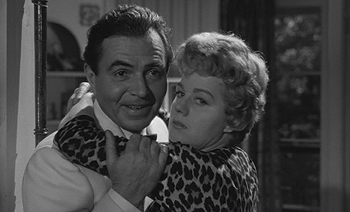 | 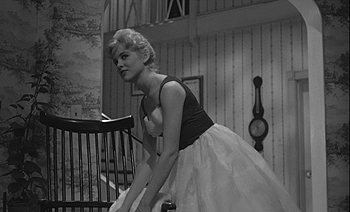 |
Shot 127 | Shot 128 |
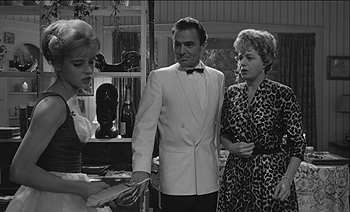 | 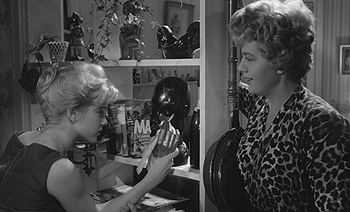 |
128 MS Lolita sitting. (33:36)
LOLITA: But mom.
She stands and walks over to the bookcase with the hand and quill and outlines the eyes of a bust on it.
LOLITA: I'm hungry and I've got to have something to eat.
CHARLOTTE: All right.
Humbert exits right.
CHARLOTTE: But you take it upstairs and after you've eaten it you go right to sleep, hmm?
LOLITA: Did you have a good time dancing with Clare Quilty?
CHARLOTTE: Well, of course. He's a very erudite, gentleman.
LOLITA: Yeah I know. All the girls are crazy about him, too.
CHARLOTTE: That's neither here nor there.
LOLITA: Since when?
HUMBERT (returning with the sandwich): Here we are. Excuse me. It's loaded with mayonnaise, just the way you like it.
NOTE: Thanks to David for alerting me as to the titles of the different books in this scene. "In Lolita, the book that you were referring to as MA is Maya: The Riddle and Rediscovery of a Lost Civilization by Charles Gallencamp. Underneath Maya on the lower shelf is The Rainbow In The Spray by Pamela Wynne (pseudonym of Winifred Mary Watson Scott)."
129 MS Lolita sitting again. (34:11)
LOLITA: Thank you.
Taking the sandwich, she sits and digs in.
CHARLOTTE: Uh, darling, take it upstairs.
LOLITA: I don't wanna go to bed, it's too early.
CHARLOTTE: We all think that Lo should go to bed.
LOLITA: I don't have to. This is a free country.
CHARLOTTE: Which means there will be no allowance this week.
LOLITA: Which means I think you stink this week.
CHARLOTTE (grabbing her): To bed, this instant!
Shot 129 | Shot 130 |
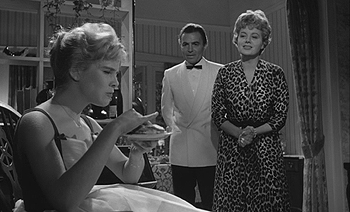 | 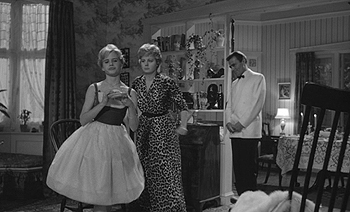 |
Shot 131 | Shot 132 |
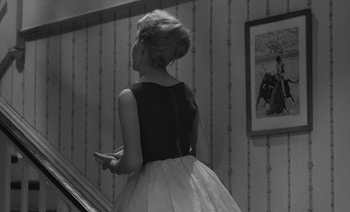 |  |
130 LS Lolita crossing the room away from Charlotte and Humbert. (34:34)
LOLITA (in a mocking duck voice): Go to bed.
CHARLOTTE: I heard that.
131 MS Lolita mounts the steps, glancing back. (34:38)
132 MLS Humbert and Charlotte gaze after her. (34:41)
HUMBERT: Night, Lo.
133 MLS Lolita on the second floor continuing to her room (34:45)
134 MS Charlotte and Humbert. (34:47)
CHARLOTTE: Well, that miserable little brat. (Cleaning up after her, picking up her gloves and stole.) She is becoming impossible. Simply, impossible. The idea! The idea of her sneaking back here and spying on us!
HUMBERT: I don't think she was spying on us.
CHARLOTTE: Oh, really? What would you call it?
HUMBERT: I'm sure she intended no harm.
CHARLOTTE: Like hell she didn't. She's always been a spiteful little pest! Since the age of one! (Picking up Lolita's shoes.) You know she kept throwing her toys out of her crib so I would have to keep stooping over to pick them up?! She has always had some kind of gripe against me. Now, now, she sees herself as some kind of a starlet! Well, I see her as a sturdy, healthy, but decidedly homely child!
Humbert, returning to the table, cracks a nut.
CHARLOTTE: I mean, is it my fault if I feel young? Why should my child resent it? You don't resent it, do you? Do you think that I'm just a foolish, romantic, American girl?
HUMBERT: No, no, no.
CHARLOTTE (trying to recover): Let's uh... (She takes the nut cracker from Humbert.) Why don't I throw on a wrap and we can go out for a little ride in the car.
HUMBERT (Shows her his watch): It's a little late, Charlotte.
CHARLOTTE: Well, let's at least finish our, champagne? (Grabs the champange from the shelf.) Shall we?
HUMBERT: I've had a very exhausting evening, I think I'd best go to bed.
CHARLOTTE: But it's not even one.
HUMBERT: My neuralgia's about to strike, with heartburn, an old ally. And, so...oh. (He places the broken nut shell in her hand.) Good night. And thank you for a charming evening.
CHARLOTTE: You've very welcome.
Shot 133 | Shot 134 |
 | 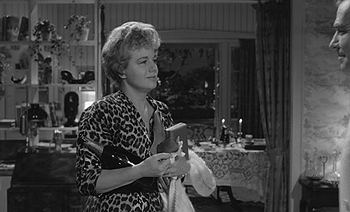 |
Shot 135 | Shot 136 |
 | 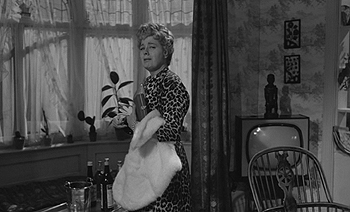 |
135 LS Humbert ascends the stairs, glancing back. (36:15)
136 MS Charlotte. (36:20)
Charlotte whimpers with exasperation. Fade to black.
What a marvelous scene this is and Kubrick is to thank for nearly all of it. And Shirley Winters and James Mason, of course. They are amazing.
Nabokov's screenplay version of this is briefer. As Charlotte puts on music (a choice of Bardinsky or Bartok, Bardinsky is chosen, I think Bardinsky refers to the Bard as I can find no Bardinsky composer before the 1950s) Humbert protests that he doesn't think these teen parties are properly chaperoned. She attempts to teach him to dance. Almost immediately, Lolita arrives home. There's no sandwich that's made. She gets some cookies to take upstairs. Charlotte complains, "Well, if you want to pamper your pimples". Lolita asks if her mother enjoyed her talk with the famous author, remarks that Rose is crazy about him then goes upstairs. Humbert asks who is this author and Charlotte tells him he's the author of The Nymphet. Humbert also then retires, pleading neuralgia and heartburn, rather than accepting an invitation for a nightcap. There is no overtly passionate revelation that Humbert must sidestep.
Some of the conversation comes from the book, on a night when Lolita, Charlotte and Humbert are sitting on "the piazza" and Charlotte is describing a movie about a down-and-out boxer who meets a priest who was once a boxer. In turn, Humbert tells of his Arctic adventures while stroking Lolita. When Charlotte tells Lolita, "And now we all think that Lo should go to bed," Lolita replies, "I think you stink," and Charlotte threatens her with not being able to go on a picnic the next day. Lolita protests it's a free country but goes to bed. Charlotte then complains about Lolita throwing the toys out of the crib etc., how she's a regular pest.
From Charlotte's first appearance on, Kubrick has played with her being a cat woman, and she is sometimes described as a cat woman in the book. In the scene of Humbert's arrival she was wearing a leopard pattern belt. In the kitchen scene following this one she will be wearing the same belt with a leopard print shirt. Here, slipping into something cozier, she chooses (mrooow) full on leopard.
Though the murder of Quilty scene had the Romney portrait sitting atop a ferociously fanged tiger rug rather than a leopard, that too would be an allusion to Charlotte.
Domino, in Eyes Wide Shut was accompanied by a plush tiger as she reclined on her Tree of Life bedspread.
But the film in which Kubrick really pursued the cat woman and linked it with other symbols so to make it more than a predatory female was in A Clockwork Orange.
It is in A Clockwork Orange that Kubrick pairs the cat woman of the health farm with twin sphinxes before her door, and other ideas that make clear she is intended to be evocative of the legendary sphinx of the Oedipus myth, a subject which I've already discussed at length in my analysis of that film. And we should look at Charlotte's outfits as suggesting this myth appears in Lolita as well.
Not only do we have Humbert becoming Lolita's stepfather, in the book, after Charlotte's death, Humbert leads the Farlows to believe that he is Lolita's real father, that he and Charlotte had met just prior her marriage to Harold Haze, had a brief but hot relationship, then he had returned to Europe and Charlotte had been already pregnant when she married Harold Haze. In the book, Humbert takes pleasure in imagining Lolita as his daughter.
In A Clockwork Orange the encounter with the cat woman leads to Alex murdering her, which propels him into prison and thus eventually into the Ludovico experiment.
In Eyes Wide Shut, Bill fortunately does not have sex with Domino as when he returns the next day he learns she discovered she has HIV. He would likely have had sex with her, however, had he not been interrupted by Alice's phone call..
Lolita picks up a hand sculpture that is holding a white quill, picks her fingernails with it then outlines the eyes of a sculpted head with it as she queries her mother as to whether or not she had a good time dancing with Quilty. The quill refers to Quilty both as a play on his name and as a reference to his being a writer.
As Lolita speaks to her mother about Quilty, we see also a book in the background. The name on its title seems to be May but we only see Ma at this point. (The title is actually, Maya: The Riddle and Rediscovery of a Lost Civilization by Charles Gallencamp. Thanks to Madison J for alerting.) I think there would be relevance to the situation as it so stands out. There's MA, big and bold. But there's no reason to reiterate the concept of mother. We already know that Charlotte is the mother. Instead, especially with Quilty referred to several times as having an "Oriental" sensibility, I'm opting to look at the Japanese word Ma, another pointer to this being Charlotte saying, "That's neither here nor there." Which is Ma. It is the place between. Wikipedia, which shows the kanji, gives it as translating roughly in Japanese as a gap, space, pause, or the space between two structural parts. Suggestive of an interval. "...ma can be defined as experiential place understood with emphasis on interval." The violinist, Isaac Stern, related it in music as the spaces between the notes, "silences which give form."
That space between interests me as I believe we have it expressed with the monolith at the end of 2001. The monolith is there fully revealed as the "inbetween", the line that divides symmetry, reversals.
The kanji for Ma is made up of the symbol for "door" and the one for "sun", which also fits with the monolith's conjunction with the sun in 2001, and it becoming a door in the end for Dave and the viewer as we pass through it with his rebirth.
Take a look back at shots 72 and 73. I suggest we have Ma here three times. It is the interval, the space, as Charlotte and Humbert pass from room to hall, the camera crossing behind the black interval of the partition. Kubrick's usage of these spaces as Ma will be explicitly felt in the next section, part three of the analysis, relative Charlotte's death, and I will review it there. But once one becomes sensitive to Ma one can find its expression in any number of ways in Lolita.
Some further word play with Ma is had when Humbert returns with Lolita's sandwich. What is a sandwich but two pieces of bread with whatever inbetween. In this case, extra ma-yonnaise, just the way Lolita likes it. Just as she will like Quilty's "oriental" philosophical look on life. I know that will probably sound absurd but it possibly does fit, reinforcing that Ma here is the space between. We also have "maya" in mayonnaise.
The book beneath the Maya book is Rainbow in the Spray. I find that someone has commented on the internet, concerning baby names, "For the person who does not know the meaning in japanese - ma means true, ya is night. Though it's more common to spell it maaya, ma for true, aya for rainbow." Instead, aya means "colorful" or "beautiful". The Ma here is a different kanji and means "genuine" or "pure".
The Ma that is the space or pause is read "aida" in the original Japanese. I also read that it means "to take some time" which will have significance in section three.
The sandwich may remind of the speared sandwich at the opening of the film.
Toasted. I bet they tried untoasted bread first and it fell to pieces.
Nabokov's book is full of puns. Why not look for them in Kubrick's work?
Quilty refers to himself also in the "inbetween" sense at the Enchanted Hunters Hotel. When asked how he occupies himself to get rid of excess energy he replies that he does Judo with Vivian Darkbloom (remember, she is Nabokov's way of implanting himself in the novel by way of an anagram). Quilty says that Vivian sweeps his ankles out from under him and he goes down with a hell of a bang. Of it he says, "I sorta lay there in pain but I love it, I really love it. I lay there hovering between consciousness and unconsciousness. It's really the greatest." It's a liminal experience. So, we once again have a state of "inbetween" and here it is united with Japanese through Judo. None of this is about the Judo is in either the novel or Nabokov's screenplay. If it was improvisation, one needs to remember that the improvisation was not entirely without direction and that Sellers worked on it with Kubrick coming up with what was appropriate for the scene.
The next time we have a "bang" in the film, after Quilty's speaking of going down with a bang, is with the blow-out of the tire in the Badlands. It's in this scene that Lolita comes down with the Asiatic flu. I discuss this further in that section.
Ma carries within it the concept of the void, negative space. Implied is a demarcation, as a fence. MA is prominently placed in this scene. In the next scene, in the kitchen, a big box of ALL is display. All is rather its opposite, the idea of everything.
137 CU Humbert writing in a journal. 36:46
Fade in from black, Humbert writing with a nib fountain pen (reminding of a quill).
HUMBERT: What drives me insane is the two-fold nature of this nymphet. Of every nymphet, perhaps.
138 MS Humbert writing in a journal. (36:53)
HUMBERT: This mixture in my Lolita of tender, dreamy, childishness, and a kind of eerie vulgarity.
139 MS Charlotte cooking breakfast. (37:01)
HUMBERT (voice over): I know it is madness to keep this journal, but it gives me a strange thrill to do so. And only a loving wife could decipher my microscopic script.
The camera zooms out as Charlotte advances to the table, where Lolita sits with her cereal, to place eggs on a plate for Humbert.
As I've noted above, in the section where I discuss the concept of Ma, we have its opposite expressed in the "all" displayed on the box of detergent that is as prominently displayed as the Ma book.
CHARLOTTE: Miss, in this house we don't eat with the table on the el...with the elbows on the tables!
She pulls Lolita's elbow off the table. Lolita is pouring sugar on her cereal.
CHARLOTTE: Must you pamper your pimples?!
She takes the sugar from her and puts it on Humbert's tray.
LOLITA: Do you mind if I eat? I've got to meet Mona.
CHARLOTTE: Oh, this morning you have to meet Mona. Last night...first, you wash every dish then you go upstairs and you make your bed and you clean up your room. I am not picking up after you today, miss!
140 MCU Lolita (37:45)
Shot 139 | Shot 140 |
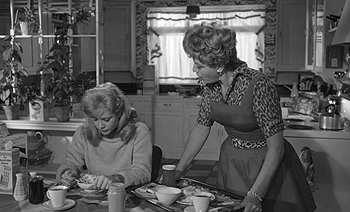 |  |
CHARLOTTE: Or any day!
141 MS Charlotte enters the front hall from the kitchen, carrying the tray. (37:48)
The phone rings. As she answers the phone, Lolita rushes for it.
CHARLOTTE (answering): Hello?! Excuse me.
LOLITA: Is it Kenny?
CHARLOTTE: No. Just a minute. Jean, uh, just a second. Take this tray up to Professor Humbert, and do not disturb him. Yes ma'am.
LOLITA: Yes, ma'am!
CHARLOTTE: Jean, I'm very glad you called.
The camera pans up away from Charlotte to follow Lolita up the stairs as she snacks on Humbert's bacon.
CHARLOTTE: Yes? Mona? What time? Well, I'm very glad you called me, Jean. Well, there's something very important we both have to talk about. That's a good idea. I'd rather not discuss...
142 MS Humbert writing at his desk. (38:35)
HUMBERT: Come in.
He turns the journal over to blot it. As Lolita brings in his tray he slips the journal in a drawer.
We may notice the big sugar bowl is gone.
HUMBERT: Thank you, very much. Good morning.
143 CU Humbert shutting away the journal. (38:45)
LOLITA: Good morning.
NOTE: Thanks to David" for noting that "we see 'Europe' by Thomas Pickles in Humbert's desk drawer". Appreciate the info.
144 MS Humbert and Lolita. (38:50)
He locks the drawer and slips the key in the next drawer. Lolita continues eating his breakfast, taking his toast.
LOLITA: Don't tell mom but I ate all your bacon.
HUMBERT: You have a very long face today.
LOLITA: Oh, yeah? (She makes a face behind his back.) What were you writing?
HUMBERT: I was writing an uhm poem.
LOLITA: Oh, yeah? What's it about? (She tries the locked drawer.)
HUMBERT: It's about people.
LOLITA: That's a novel subject. You know, it's funny, it sort of looked like a diary when I came in.
HUMBERT: I always write my poems in a diary. It's one of my little idioysyncracies.
LOLITA: Afraid someone's going to steal your ideas and sell them to Hollywood, huh?
HUMBERT: Perhaps. Would you like me to read you some poetry?
LOLITA: Sure, why not?
HUMBERT: This is my favorite poet. (Opens a book and begins to read.) It was...
LOLITA: Which poet?
HUMBERT: The divine Edgar.
LOLITA: Who was the divine Edgar? Edgar who?
HUMBERT: Edgar Allen Poe, of course.
"It was night in the lonesome October
Of my most immemorial year."
Notice how he emphasizes this word.
"It was hard by the dim lake of Auber
In the misty mid region of Weir."
You see, he takes a word like "dim" in one line and twists it? You see? And it comes back as "mid region of Weir".
LOLITA: "Mid region" and twists it to "dim". That's pretty good, pretty clever.
HUMBERT: "Thus I pacified Psyche and kissed her
And conquered her scruples and gloom
And we passed to the end of the vista
But were stopped by the door of a tomb
And I said, 'What is written, sweet sister?'
She replied, 'Ulalume, Ulalume'."
145 CU Lolita. (40:41)
LOLITA: Well, I think it's a little corny, to tell you the truth.
HUMBERT: Oh. What do you object to?
LOLITA: Well, the "vista-sista", that's like, "Lolita-sweeta".
Shot 143 | Shot 144 |
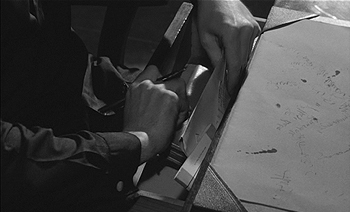 |  |
Shot 145 | Shot 146 |
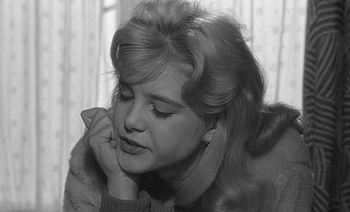 |  |
146 MCU Humbert and Lolita. (40:52)
HUMBERT: That's very true. That's a very acute observation. If you were in my class I would give you an A plus.
Lolita sits on the window casement.
HUMBERT: Tell me, was Mona Farlow annoyed when you left her party last night?
LOLITA: Mona? Annoyed?
HUMBERT: I thought she might be looking forward to...
LOLITA: Don't worry about Mona.
HUMBERT: Oh?
LOLITA: Let me tell you something about Mona.
HUMBERT: Do, please.
LOLITA: No, I'd better not tell you. You'll blab.
HUMBERT: I will never give away any of your secrets.
LOLITA: You wouldn't?
HUMBERT: I promise.
LOLITA: Oooh. Well, for that you get a little reward.
HUMBERT: Thank you very much.
Lolita holds a fried egg over his head, teasing him to take a bite.
LOLITA: Here!
HUMBERT: Oh, no. Please, Lolita. No.
LOLITA: Put your head back. Put your head back. Open your mouth. You can have one little bite.
Humbert grasps her wrist and takes a bite out of the egg.
147 MS Charlotte calling up from the foot of the stairs. (41:52)
CHARLOTTE: Lolita. Lolita!
LOLITA (off screen): What?
CHARLOTTE: Come down here!
We hear the door opening.
148 MS Lolita on the second floor. (42:03)
LOLITA: What do you want?
CHARLOTTE: Firstly, when I call for you I want you to come right down and not make me holler for you from room to room.
LOLITA: Yes, ma'am.
Shot 147 | Shot 148 |
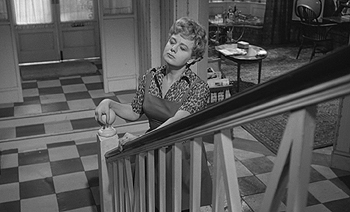 | 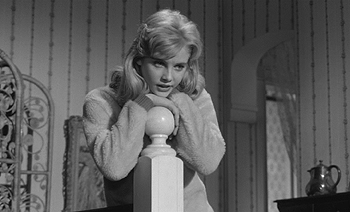 |
Shot 149 | Shot 150 |
 | 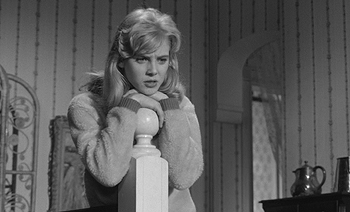 |
Shot 151 | Shot 152 |
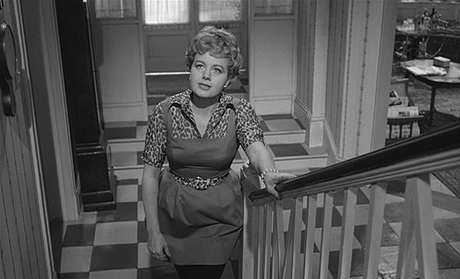 | 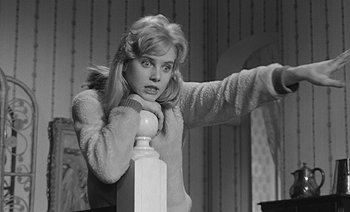 |
149 MS Charlotte at the foot of the stairs. (42:19)
CHARLOTTE: Secondly, I want you to go right into your room and put on a dress. I'm going to the Farlows and I want you to come with me.
150 MS Lolita looking down from the height of the stairs. (42:24)
LOLITA: But I'm supposed to meet Mona at the lake.
151 MS Charlotte at the foot of the stairs. (42:26)
CHARLOTTE: And, lastly, I forbid you to disturb Professor Humbert, again. He is a writer and he is not to be disturbed.
152 MS Lolita on the second floor. (42:32)
LOLITA (making the Nazi salute): Seig heil.
This is a fairly long section to look at, beginning with Humbert writing in his diary, moving to the kitchen scene, Lolita going up to Humbert's room, her time in Humbert's room, and then her mother calling her to come downstairs. Much of this is in the screenplay and book but not arranged as it is here.
In the screenplay, the scene about Poe occurs when Humbert and Lolita are staying at the Baskerville Cottage, after Lolita learns of her mother's death and realizes she has only Humbert now to depend upon. They are outside, Humbert working on notes on Poe for his lectureship, and he tells her he wants to read her a poem. He reads her part, and instead of talking about how it twists, he says, "Notice how nicely the 'dim' is read back and becomes 'mid', misty mid-region..." There is no egg play.
Also in the screenplay, after the dance and Lolita interrupting Charlotte's planned romantic evening with Humbert, a couple or several days later we have Humbert in his room listening to his taped notes on Poe's poem commemorating his marriage to thirteen-year-old Virginia (assumed to be Annabel Lee). Lolita comes up to his room and asks him what he's been drawing, and he replies at first, "Is it you?", then states it's a portrait of a girl he knew when he was her age. He shows her a photo of the girl and tells her it was taken at "a princedom by the sea." Nabokov notes this girl should be the same actress as Lolita, but that Lolita doesn't see the resemblance. Charlotte interrupts, calling Lolita downstairs, and tells her to put on a dress as they're going to the Chatfields (replaced in the movie by the Farlows), and that she is not to disturb Mr. Humbert.
In the novel, Humbert's musing on his danger on keeping the diary is on another day from that of his contemplating the two-fold nature of Lolita.
Kubrick instead takes us from the scene in which Lolita played with the quill feather, to this one, opening with the nib of Humbert's pen (echoing the quill) as he writes in his diary.
While he records his thoughts on Lolita's two-fold nature, we go to the kitchen where Charlotte scolds Lolita about all the sugar she dumped on her corn flakes, and that she's pampering her pimples, which is something Charlotte instead said, in the screenplay, when Lolita takes cookies up to her room after interrupting Charlotte and Humbert after the dance.
Note how Charlotte messes up and says, "...we don't eat with the table on the el...with the elbows on the tables!" It comes off as the result of fury and anxiety. But this is also a mix-up of words, putting them in reserve order, that presages Humbert's relating to Lolita how Poe mysteriously writes, taking a word like "dim" and twisting it so it is "mid".
Humbert had just been reflecting on the two-fold nature of Lolita, her innocence and vulgarity, and the musings on mid and dim and now we have in this section being a typical sugar-loving teen and making rebellious monster faces, but Kubrick could also be referring to Lolita as a form of "Lilith", which derives from the Hebrew layil meaning "a twist (away of the light)", as in night, also deriving from luwl which is "to fold back, a spiral step, winding stair".
Nabokov and Kubrick, with Lolita's commentary on the poem, refer back to the scene in the kitchen, with her describing it as corny (the corn flakes) and the line Lolita-sweeta would refer to all the sugar she consumes, so that even the sugar bowl disappears from the tray by the time Lolita enters Humbert's room, and she's eaten all his bacon as well.
The choice to condense the reading of the poem scene and the one in which the photo of Annabel Leigh reveals she is the same actress as is playing Lolita is due the nature of the poem, which is about déjà vu and fate.
In my analysis of A Clockwork Orange I've already written a couple of times on the poem and will quote part of it below rather than paraphrase. What I wrote in A Clockwork Orange concerns that part of the film in which the psychiatrist shows Alex pictures after his attempted suicide, the last one being a woman handing him a bunch of eggs and asking what he wanted to do with them. Becoming emotional and angry, he says he wants to smash them and hits his leg with his fist, hurting himself as he is still all broken bones healing from his suicide leap. The psychiatrist smiles and tells him everything is good. Though we don't know how, and the psychiatrist won't discuss it, we understand Alex's programming has been moderated so he he is once again able to display anger or behave aggressively.
If we return to the "divine Edgar" and his poem "Ulalume", which Humbert had partially recited to Lolita, we see that psyche (soul, mind) is a prominent player, and thus perhaps we may find a hint of this in Dr. Taylor as the psychiatrist. In Lolita, Humbert promised Lolita during the divine Edgar scene that he would never reveal any of her secrets, which is when she offered him the reward of the egg. Here, the psychiatrist (psyche) has a secret concerning Alex and his dreams she wishes not to divulge. In "Ulalume", the poem that Humbert had partly read to Lo, Poe's psyche attempts repeatedly to prevent him from following a path he will later discover leads to the tomb of his lost Ulalume. Along the way he spies the star of Astarte which his psyche mistrusts.
And now, as the night was senescent
And star-dials pointed to morn -
As the star-dials hinted of morn -
At the end of our path a liquescent
And nebulous lustre was born,
Out of which a miraculous crescent
Arose with a duplicate horn -
Astarte's bediamonded crescent
Distinct with its duplicate horn.
And I said: "She is warmer than Dian;
She rolls through an ether of sighs -
She revels in a region of sighs:
She has seen that the tears are not dry on
These cheeks, where the worm never dies,
And has come past the stars of the Lion
To point us the path to the skies -
To the Lethean peace of the skies -
Come up, in despite of the Lion,
To shine on us with her bright eyes -
Come up through the lair of the Lion,
With love in her luminous eyes."
But Psyche, uplifting her finger,
Said—"Sadly this star I mistrust—
Her pallor I strangely mistrust:—
Oh, hasten! oh, let us not linger!
Oh, fly!—let us fly!—for we must."
In terror she spoke, letting sink her
Wings till they trailed in the dust—
In agony sobbed, letting sink her
Plumes till they trailed in the dust—
Till they sorrowfully trailed in the dust.
I replied—"This is nothing but dreaming:
Let us on by this tremulous light!
Let us bathe in this crystalline light!
Its Sybilic splendor is beaming
With Hope and in Beauty to-night:—
See!—it flickers up the sky through the night!
Ah, we safely may trust to its gleaming,
And be sure it will lead us aright—
We safely may trust to a gleaming
That cannot but guide us aright,
Since it flickers up to Heaven through the night."
Thus I pacified Psyche and kissed her,
And tempted her out of her gloom—
And conquered her scruples and gloom:
And we passed to the end of the vista,
But were stopped by the door of a tomb—
By the door of a legended tomb;
And I said—"What is written, sweet sister,
On the door of this legended tomb?"
She replied—"Ulalume—Ulalume—
'Tis the vault of thy lost Ulalume!"
Then my heart it grew ashen and sober
As the leaves that were crisped and sere—
As the leaves that were withering and sere,
And I cried—"It was surely October
On this very night of last year
That I journeyed—I journeyed down here—
That I brought a dread burden down here—
On this night of all nights in the year,
Oh, what demon has tempted me here?
Well I know, now, this dim lake of Auber—
This misty mid region of Weir—
Well I know, now, this dank tarn of Auber—
In the ghoul-haunted woodland of Weir."
Astarte is a fertility goddess, her name coming from a word for "womb" (so I read). Her symbols include the sphinx, hinted at above with the lion.
So, in "Ulalume", which Kubrick has quoted in Lolita--and we find is obliquely referenced here and at Edgwarebury, where Alex attempts suicide--Poe's psyche attempts to keep him from taking a path that turns out to be one he had taken the previous year, of which he was unconscious, and thus he experiences deja vu and comes again on the tomb of Ulalume.
We find the same in The Shining, again connected with eggs, Wendy serving Jack a breakfast of eggs and as he eats it he recounts how when he'd arrived he'd experienced such deja vu he felt he knew what would be around every corner, and fell in love with it immediately. Then, later, with the Advocaat incident (Advocaat being made of eggs) he had a collision with the past and retiring to the bathroom with the waiter is goaded and "egged on" (my wording) to deal in no uncertain terms with the so-called rebelliousness of his wife and son.
The main idea in these scenes is that of deja vu and repetition, as in the poem. We've also something of a formula with deja vu associated with eggs/Edgar/edge and the reversals exhibited in dim becoming mid. In Lololita there is the consuming of the eggs with the reading of the poem by the divine Edgar and the talk of the reversals. In The Shining Jack eats eggs when he speaks of deja vu (we see also a reverse image of the scene in the mirror) then when he enters the past in the Gold Room and the red bathroom he has the Advocaat (eggs) spilled on him and is surrounded with mirrors.
Why eggs? A formula has been established in Lolita and Kubrick seems to be just carrying this into films thereafter. But deja vu is often referred to in Kubrick's films and happens frequently outside this forumla.
Alex, released from prison, had found himself accidentally visiting scenes from his former life. Deja vu.
The past repeating itself is the subject of the "Uncanny Tales" comic in Alex's prison cell. One comic showed a developing photo of a train running into a wagon on a railroad track and had with it the dialogue balloon of "Holy smoke! I've photographed something that happened a century ago!" Deja vu. Repetition.
Kubrick's deja vu does not mean an exact re-experiencing of events. Alex has deja vu when he runs into again the Irish bum he had abused, only this time Alex is abused. He has deja vu when he returns HOME, by accident, where he had tortured Alexander and raped his wife. We've a cycling about into same territory though experience within it alters. My notes on Remembrance and Repetition in Kubrick's "The Shining" deal with this especially concerning Room 237.
In 2001, Frank takes the same space walk as had Dave only Frank ends in being killed.
With these recyclings in Kubrick's films, nothing ever occurs exactly as happened before. Alex only appears to be returned to being the same Alex as at the beginning of the film, but is different. Just as Jack does not end in killing his family, as did a prior caretaker, and instead freezes in the maze. And Lolita here is different from Humbert's Annabel.
In Eyes Wide Shut Bill instead consciously pursues recurrence by returning to places he had previously visited, but he is also warned away from exploration.
Of interest to me is that this isn't in the novel so why would Nabokov insert the poem and his discussion on dim becoming mid in the screenplay? I'm inclined to wonder if in their discussions Kubrick hadn't suggested this to Nabokov, just as he told Nabokov they needed to start the film with Quilty's death. Kubrick told Nabokov that it was a matter of structure organized to keep the viewer involved by way of wondering who Quilty is and what he does so their interest doesn't wane after Humbert's bedding of Lolita. But we know that Kubrick was interested in cycles, in deja vu This had been already previously expressed in films such as Fear and Desire which began and ended with the same imagery. 2001 was concerned with Nietzche's "the eternal return", which Kubrick instead conceives as more of a spiral and, again, he begins and ends the film with much the same imagery though with a change. And in Lolita Kubrick will begin and end with Humbert entering Quilty's mansion, and though the end looks like a simple repeat of the beginning, instead there are very subtle differences.
Fear and Desire Opening | Fear and Desire Closing |
 |  |
Shot 2 from Lolita | Shot 538 from Lolita |
 | 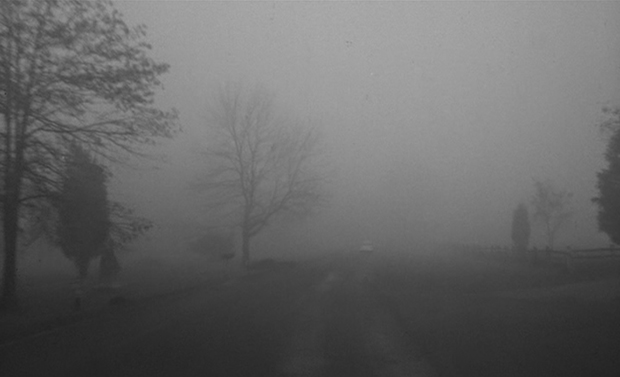 |
The "misty mid region of Weir"?
Nabokov does not have the cycle in the screenplay, nor does he have it in the book--at least not in this so conspicuous manner--which ends with a variation on this shooting scene.
I have to wonder if the eggs connect also with the table tennis game and the origin of "love" as representing a zero score, one story being that we have in this a reminiscence of the l'oeuf, the french word for egg, the egg having the same shape as a 0.
The jam or jelly jar on the breakfast tray Lolita carries to Humbert's room is S&W. Waw in Hebrew is vav, represented with V. ShV in Hebrew means "to return".
Continuing with the above, let's return also to the idea of Ma, which twists in this section just as dim is turned to mid.
I don't know about the northeast, but I was raised in the northwest and had never heard ma'am until I moved south, nor was I acquainted with the customary useage of "ma'am" in the south, especially by children who were supposed to reply, "Yes, ma'am" or "No, ma'am" and if they did not were taken as being impudent.
This got me in some trouble as a child. Lots of trouble. Southerners weren't aware that not everyone partook of their customs.
All of this to say that I'm sensitive to the use of ma'am in conversations and that ma'am seems to me a very southern thing to say and so stands out to me as somewhat out of the ordinary in this northeastern home.
The use of "ma'am" appears nowhere in the screenplay. It also appears nowhere in the book. This seems again to be a Kubrick insertion, and as it appears only now in this scene, in which we have Humbert lecturing Lolita on the turn of dim to mid, I take it as another example of a reversal, like the horizontal flips Kubrick will use numerous times in 2001. This is incorporated in the mirroring of ma in "ma'am".
Also note that the insertion of "ma'am" takes place at the staircase that has steps that double back and this section begins with Humbert writing of the two-fold nature of Lolita. We may also have, again, Lilith, as I've brought up before, the word deriving from luwl, "to fold back, a spiral step, winding stair"."
153 MCU Charlotte ringing a bell. (42:35)
154 MS Humbert seated at the table with Charlotte. (42:38)
CHARLOTTE: You know, I have a glorious surprise for us.
HUMBERT: One of your dramatic sweets?
CHARLOTTE: Guess again.
Louise enters, in response to the bell, bringing a tray to the table.
HUMBERT: Then...the Farlows have been arrested.
155 MS Charlotte with a cigarette, from behind Humbert's right shoulder, Louise placing a tray on the table. (42:52)
CHARLOTTE: Oh, really, Hum. Thank you, Louise.
Humbert lights her cigarette.
HUMBERT: I'm no good at guessing.
CHARLOTTE: Mona Farlow is leaving for summer camp tomorrow?
156 MS Humbert from behind Charlotte's left shoulder. Louise exiting at the rear. (43:02)
CHARLOTTE: Lolita is going with her. You were absolutely right last night when you warned me that I was getting too liberal with her about boys.
157 MS Charlotte from behind Humbert's right shoulder. (43:11)
CHARLOTTE: What's more, Mona disappeared from that party last night and she did not come home 'til 4 a.m. So Jean and I decided that isolation from boys would be the best thing for the girls...
158 MS Humbert from over Charlotte's left shoulder. (43:24)
CHARLOTTE: ...this crucial summer.
HUMBERT: Yes. Do...do you think that the camp...
159 MS Charlotte from behind Humbert's right shoulder. (43:30)
HUMBERT: ...is the answer?
CHARLOTTE: Oh, frankly, Hum, I do. And it's all arranged.
160 MS Humbert from Charlotte's left shoulder. (43:35)
CHARLOTTE: The Farlows and I phoned the camp long distance. And I did all the shopping this...is something the matter with your face?
HUMBERT: Toothache.
CHARLOTTE: Oh, you poor man.
161 MS Charlotte from behind Humbert's right shoulder. (43:46)
CHARLOTTE: If it still pains you tomorrow, I'll call and arrange an appointment.
162 MS Humbert from Charlotte's left shoulder. (43:50)
HUMBERT: How far away is this camp?
CHARLOTTE: Hmm, 200 miles. It was a stroke of genius on mama's part.
163 MCU Charlotte. (43:46)
CHARLOTTE: Ain't I clever?
164 MCU Humbert. (44:00)
CHARLOTTE: Shall we uh...
165 MS Charlotte from Humbert's right. (44:02)
CHARLOTTE: ...take our coffee out to the piazza?
166 MS Humbert from Charlotte's left. (44:06)
CHARLOTTE: Or do you want to go upstairs and nurse that tooth?
HUMBERT: Nurse the tooth.
Fade to black.
Shot 153 | Shot 154 |
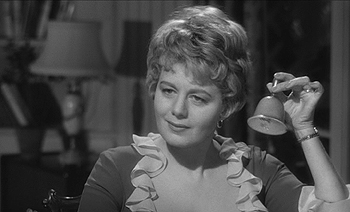 | 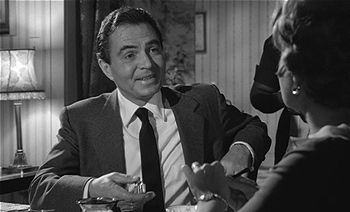 |
Shot 155 | Shot 156 |
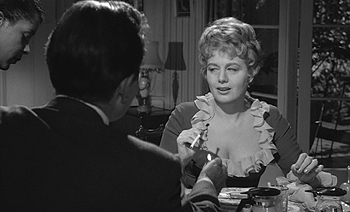 |  |
Shot 157 | Shot 158 |
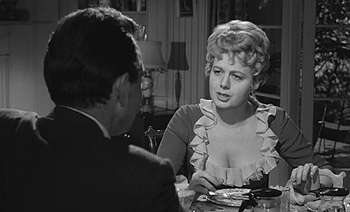 | 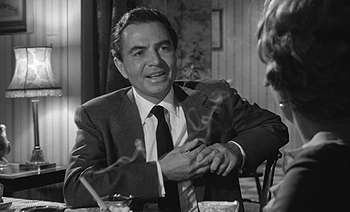 |
Shot 159 | Shot 160 |
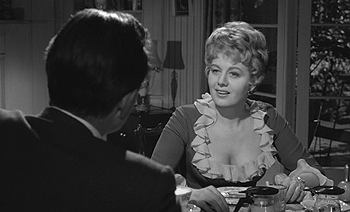 | 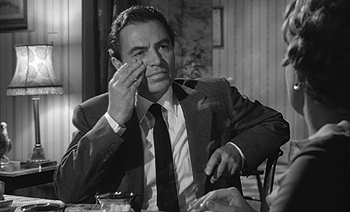 |
Shot 161 | Shot 162 |
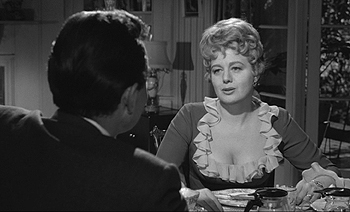 | 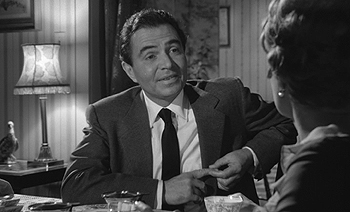 |
Shot 163 | Shot 164 |
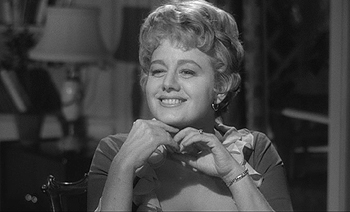 | 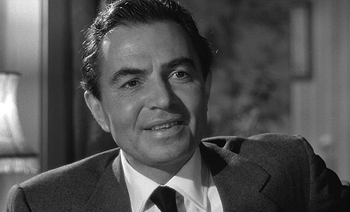 |
Shot 165 | Shot 166 |
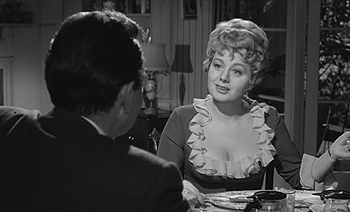 |  |
The Nabokov screenplay is almost exactly as this scene with the exception that Louise is not present so is not serving the pair.
The same scene is had in the book. Humbert finds the table dressed up and Lolita off at a movie. Charlotte tells how Mrs. Chatfield's daughter, Phyllis, is going off to camp and Lolita shall also be going. Humbert pleads a toothache so to be able to run away and upstairs. Charlotte speaks of Dr. Quilty, their dentist, an uncle or cousin of the playwright, and that she can get an appointment for him. At the end of their conversation she asks if he'd like to go out on the piazza or nurse the tooth and he opts for the latter.
When Humbert first looks at the house, Charlotte attempts to win him over with her pastries. When she asks what inclined him to become a boarder, he says it was the cherry pies. In the previous scene, Charlotte berates Lolita for putting so much sugar on her cereal, then by the time Lolita makes it to Humbert's bedroom with the breakfast tray, the sugar bowl on it has disappeared. In the poem that Humbert reads to Lolita we have the line, "What is written, sweet sister", sister vaguely rhyming with "vista" two lines before, to which Lolita responds that she objects to this as it's kind of corny. "Well, the 'vista-sista', that's like 'Lolita-sweeta'." Now, Charlotte says she's a glorious surprise. Humbert asks if it's one of her sweets and finds instead that Charlotte is sending Lolita away. No more sweets.
I want to briefly point out the beautiful dialogue of the lamps such as in shots 165 and 166. Every time Charlotte is in MCU we have beyond her the unlit lamp twinned with its especially crisp, dark shadow cast on the wall behind it. Whenever Humbert is in MCU we have the lit lamp.
November 2014 transferred to html. Originally posted sometime before 2012. Approx 21,600 words or 43 single-spaced pages. A 166 minute read at 130 wpm.
Go to Part 3
Go to Table of Contents of the analysis (and supplemental posts)
Link to the main TOC page for all the analyses